

Sign up to our Newsletter
Top 7 medical schools in europe.

Reviewed by:
Jonathan Preminger
Former Admissions Committee Member, Hofstra-Northwell School of Medicine
Reviewed: 5/12/22
Are you or someone you know looking for an opportunity to study abroad? Europe is host to some of the highest-ranking medical schools in the world. If the charm of old architecture and delicious pastries isn't enough to draw you there, perhaps these stellar medical programs will help you decide where to study.
Here is our list of the top seven medical schools in Europe.
Get The Ultimate Guide on Writing an Unforgettable Personal Statement

Why Attend Medical School in Europe?
Beyond the incredible food, music, and scenery, Europe offers a plethora of medical programs with world acclaim. Perhaps you're looking to get more in touch with your background or learn about a new culture. There's plenty of exciting benefits to studying abroad.
Thinking ahead, where do you plan to practice medicine? If you have dreams of opening up a practice in Germany, it may benefit you to study there. Medical school is also a significant opportunity to make connections. Learning medicine in your dream country's official language may also benefit you if you're hoping to practice abroad.
A primary reason many US students look overseas for medical school is the shorter programs. Medical school in Europe typically runs 8-10 years, while a US medical program will take 11-15. This is because European med schools do not require a bachelor's degree to begin your journey into medicine.
Studying abroad might end up being cheaper as well. In many European countries, tuition is virtually free, sometimes even for international students. Though the costs of living are generally higher, you may still end up saving quite a bit by studying for free.
European Medical Schools vs. American Medical Schools
If you're studying medicine outside the US, it's essential to get informed on the main differences between EU and US medical programs. Though both are host to ivy league institutions with world-renowned acclaim, the way they go about teaching varies significantly from country to country. Here we'll go over some key differences to help you make the best choice regarding where to study.
Key Differences
- Unlike the US, students do not need to complete a pre-med education program to apply for medical school in Europe.
- Many places in Europe offer free or drastically reduced tuition, which is hard to come by in the US.
- Studying in Europe takes less time . Finishing a medical degree in Europe takes 8-10 years, including residency, while the same education in the US takes 11-15 years.
- US acceptance rates are generally lower than EU acceptance rates . US schools tend to be more competitive and have a more difficult application process.
These are just a few significant differences between US and EU medical schools to consider when planning to study abroad. To ensure a smooth transition into your European studies, do plenty of country-specific research on the requirements of EU schools.
What to Look for When Choosing a Medical School in Europe
As with any global medical school, there are a few things to look for when choosing which program to attend. Here are some primary things to take into consideration while you search for the perfect school.
The strength of a school's reputation can be determined by a number of factors, including enrollment rates, global ranking , and student testimonies. There are plenty of reliable sources to check your university's reputation before applying. It may also help to seek the guidance of an academic advisor to find a school best suited to you.
Residency Placement Rates
Most schools have accessible residency placement stats on their websites. This is a significant stat to take into consideration when choosing your future school. Keep in mind that you should do your residency where you later hope to practice medicine. For example, if you are studying medicine in Europe but are hoping to become a physician in the US, you should be looking for US residencies.
Students who study abroad are not always guaranteed a residency placement when they return. However, your school's residency placement rates are significant—research how international students have been placed in residencies outside the school's country.
European schools generally have much lower tuition than US schools, although other costs may be less budget-friendly. Before getting too excited about reduced tuition abroad, consider conversion rates, cost of living, international student fees, flights home, and any other surprise costs that may come up while studying abroad.
USMLE Pass Rates
The United States Medical Licensing Exam (USMLE) is a three-step process to obtain medical licensure in the US. Observing the pass rates of previous students that have attended a school is crucial when selecting a medical school.
According to Dr. John R Gimpel , president and CEO of the National Board of Osteopathic Medical Examiners, a good sign is when schools consistently post rates above the national average.
"That helps to show that their graduates are at least succeeding well in passing their licensing exams and getting high scores, and that's usually going to mean that those doctors are going to be successful in getting into the residency programs that they'd like to and into the career paths that they like," says Gimpel.
Ability to Access Loans or Funding
Government funding for studying outside of your home country is not always as accessible as funding for a school close to home. Before applying to your international dream school, be sure to check what funding is available to you if you'll be relying on bursaries, loans, or scholarships to complete your education.
Most schools also offer specific funding for international students. Investigate the scholarships offered by your school to see if any are strictly for international students.
Top 7 Medical Schools in Europe

Taking everything above into consideration is a lot of work, but we've got you covered. Without further adieu, here is our list of the top seven Medical Schools in Europe.
1. University of Oxford
Ranked number one in the world in medicine by the Times Higher Education Supplement (2011-16) , Oxford University should be high on your list if you’re looking to study medicine in Europe. Oxford describes college life as supportive and full of opportunity.
“At Oxford, everyone is a member of a college as well as their subject department(s) and the university. Students therefore have both the benefits of belonging to a large, renowned institution and to a small and friendly academic community.”
Oxford is the oldest English-speaking university in the world, dating back to the year 1096. The school also boasts an impressive list of celebrity graduates , including 28 British prime ministers and 56 Nobel Prize winners.
Acceptance to Oxford can be challenging, considering it is an ivy league school . Be sure to read over the admission requirements and application guide if Oxford University piques your interest.
2. University of Cambridge
Cambridge, UK
Coming in at number three in the 2020 Academic Ranking of World Universities , Cambridge is another ivy league institution you should consider while browsing European universities.
Vice-Chancellor Stephen Toope describes Cambridge as a welcoming university with a deep-rooted sense of community. He states, “Today, Cambridge continues to reach outwards, welcoming an ever more diverse group of students who have the desire and ability to learn and produce new insights that shift and deepen our understanding of the world around us.”
Cambridge has impressive statistics concerning its graduates. Since 1904, there have been 110 Nobel prize award winners affiliated with the university. Cambridge also notes that 89% of graduates report having work or further study within 15 months of graduating.
If you’re curious about your chances of getting into Cambridge, check out their admission statistics . They also have plenty of open events to help introduce prospective students to Cambridge and help you with your application .
3. Imperial College London
Imperial College London has an impressive reputation and garners specific global attention toward their engineering and science programs. The school ranks 3rd in Europe and 11th worldwide according to the Times Higher Education World University Rankings 2021 , and 1st for graduate prospects.
Imperial consistently ranks highly as one of the top universities in London according to many charts. However, it has recently risen above neighboring university UCL for a few notable reasons.
The international students and student-faculty rate, employer reputation indicator, and bursary options are all areas in which Imperial comes out on top of UCL. There are also subject-specific areas in which UCL and Imperial excel, so your best option ultimately depends on your area of specialty.
According to their website, Imperial College London is "the only UK university to focus entirely on science, engineering, medicine and business." Imperial was founded in 1907 and has spent many years building its reputation, making it number three on our list.
4. University College London
Next on our list is University College London (UCL) . According to the Research Excellence Framework , UCL is the top university in the world for research strength.
Since the school was founded in 1826, there have been 30 affiliates to win Nobel prizes. Ranked joint 8th in the 2022 QS World University Rankings , UCL is a top contender for any medical student looking to study abroad.
UCL is a large school located in the heart of London with over 40,000 students. If you are looking to make plenty of connections within London's medical scene, UCL might be the place for you. Larger schools offer lots of opportunities for peer learning and developing relationships.
With critical acclaim and top global rankings, UCL is a strong contender for any student hoping to study in Europe.
5. Karolinska Institutet
Stockholm, Sweden
The Karolinska Institutet (KI) is Sweden’s largest center of academic medical research and is known as one of the top universities in the world. Since 1901, KI has hosted the Nobel Assembly to select the Nobel laureates in Physiology and Medicine.
KI also has a rich historical background. According to their website, "Karolinska Institutet was founded by King Karl XIII in 1810 as an 'academy for the training of skilled army surgeons.'" Nearly all of Sweden's medical history to date is intertwined with the institution, including the implantation of the very first pacemaker into a human being.
As a university wholly dedicated to studying medicine and research, the school typically has under 7,000 full-time students. Attending a medicine-only school can be an advantage as all of the school's resources are dedicated to one specific field.
If you are looking to study medicine in Europe and are particularly interested in research, the cutting-edge facilities at the Karolinska Institutet may be the place for you. Their 2030 vision is centered around groundbreaking research, an ethical approach, and critical reflection.
6. Catholic University of Leuven
Leuven, Belgium
Often named one of the top universities in Europe, The Catholic University of Leuven (KU Leuven) is another research-oriented university on our list. This large university has fourteen campuses across ten cities.
KU Leuven's three main faculties are separated by Humanities and Social Sciences, Science, Engineering and Technology (SET), and Biomedical Sciences. Each of these schools has a doctoral school for their training programs.
As one of the oldest schools on our list, KU Leuven was founded in 1425. Their mission statement reads that they have a "Christan view of the world and the human." They also state, "KU Leuven endeavours to be a place for open discussion of social, philosophical and ethical issues and a critical centre of reflection in and for the Catholic community."
If you are interested in studying medicine in Belgium, KU Leuven is worth checking out. We suggest brushing up on some Dutch before applying !
7. University of Copenhagen
Copenhagen, Denmark
The University of Copenhagen (UCPH) is last on our list but certainly shouldn't be overlooked by applicants looking to study clinical medicine. Coming in at number seven, UCPH is a world-class research university with over 37,000 students and 9,000 staff members.
UCPH was founded in 1479 and has since grown into the 36 departments and 200 research centers that it is today. Their website offers detailed stats to keep applicants well informed on their historical student intake. Among previous students of the university, nine have been awarded Nobel prizes.
The university’s strategy for 2023 is based around “attracting, developing and retaining academic talent, education with closer ties to research and practice” as well as “collaboration and societal commitment - nationally and globally.”
Studying abroad in Denmark requires an understanding of their quota 1 and quota 2 system, which UCPH goes over in detail on their admission requirements page. If you speak Danish or hope to learn in the near future, UCPH could be the perfect place to begin your medical journey.
Note: Each university excels in different areas. Keep in mind that rankings differ depending on which medical specification you are researching.
Honorable Mentions
These schools nearly made it to our top seven and are definitely worth checking out. Remember that each school excels in different areas. Be sure to prioritize schools according to your specific interests.
- Radboud University Nijmegen Nijmegen, Netherlands
- Heidelberg University Heidelberg, Germany
- University of Vienna Vienna, Austria
- King’s College, London London, UK
1. Is medical school in Europe free?
Although many European countries offer free tuition to citizens, this is not necessarily true for international students. Typically without citizenship, students do have to pay for school in Europe. However, European tuition is drastically cheaper than that of schools in the US.
2. Are European medical schools hard to get into?
No matter where you are in the world, studying to get into medical school will be rigorous and challenging. However, European medical schools have higher acceptance rates than schools in the US. While it won't be accessible no matter where you are, you may have a better chance of getting accepted into your EU school of choice.
3. Is medical school in Europe easier?
It has been argued that med school in Europe is "easier" since completion takes less time, and EU schools have higher acceptance rates. However, keep in mind that Europe is home to some of the top universities across the globe with world-renowned institutions, equipment, and research programs. Coursework is not easier in Europe, but it will take less time, and acceptance may be more manageable.
4. How can I fund medicine abroad?
Funding medicine abroad can be tricky if you need government assistance. Check with your government to see if you are eligible for receiving loans or grants to study medicine abroad, and get country-specific. Before selecting your dream school, ensure that funding is available to you while studying in your specific region.
There are also usually scholarships and bursaries offered by universities that are specifically reserved for international students. Do some research on the international bursaries, loans, and scholarships offered by your school of choice.
5. Can I go to med school in Europe and practice in the US?
The answer here is yes, though you will be required to obtain a US medical license. If you're looking to study in the United States after your European studies, look for residencies in the US to ease the process. Foreign residencies are not valid in the US.
It is important to note that not all foreign medical degrees are recognized as valid by the US. To avoid starting over, do plenty of country-specific research on your requirements when returning to the US to practice medicine.
6. What is the best country to study medicine in Europe?
Most of our top suggestions are in the UK, though it truly depends on your specific interests. Each school excels in different areas, and each country has different requirements. Be sure to research how easy it is to transition from your country of study to the country in which you're hoping to practice medicine.
7. Which country in Europe is the cheapest to study medicine?
Studying medicine in Europe is almost always more affordable than studying in the US, though some countries can help you save up. Poland, Sweden, and Germany are the top 3 cheapest places to study medicine in Europe, with Italy, Belgium, and Hungary following closely behind.
Considering some of the top universities in the world are located in these countries, they're certainly worth looking into when deciding where to study.
Europe is home to some of the most excellent medical schools and research facilities in the world. A degree in Europe takes less time and can be up to 6 times cheaper than studying medicine in the US. From what our research shows, it's essential to broaden your horizons when looking for a medical school.
Keep your main interests and specialties in mind when researching schools, each university across the globe excels in different areas. We hope this list helps you on your journey to finding your dream European medical school. Happy hunting!
Schedule A Free Consultation
You may also like.

Best Pre-Med Schools in New York

How To Get Into UCSF Medical School: A Guide For Applicants

Top 10 Medical Colleges in Europe: A Complete Guide

Meridean Overseas
Updated On 06 September 2023 & Read Time 15 minutes
Share this post
In today’s world, healthcare is one of the most lucrative sectors, leading to an increased demand for health professionals. Every year, many students prepare to study medical programs and build a successful career out of it. If you are also planning your career in the medical field, then choosing the right medical academy and country must be your first priority.
With its renowned advanced healthcare systems, vibrant culture and diverse career opportunities, Europe is a top destination for ambitious students like you seeking to broaden their horizons. Medical Colleges in Europe not only provide you with a solid foundation in theory and concepts but also cutting-edge medical advancements and experiential knowledge, creating a unique setting for your personal and professional growth.
Learn about the top 10 Medical Colleges in Europe in this blog, including information regarding popular available courses, eligibility criteria, and other essential aspects.
Table of Contents
- Introduction
Why Choose a Medicine Degree in Europe?
What are the top medicine specialisations in europe, what are the top medical colleges in europe, what are the eligibility criteria to enroll for medicine in europe, cost of studying medicine in europe.
- Call To Action
Studying medicine in Europe is a transformative journey blending centuries-old traditions with the latest medical advancements, as universities over here are globally recognised for their high standards of medical education.
Medical Colleges in Europe come up with a unique set of strengths, and from research-intensive programs to clinical opportunities to interdisciplinary approaches, it caters to various medical interests.
Pursuing a medicine degree in Europe equips you with the knowledge and expertise necessary to excel, whether you choose to practice medicine locally or internationally.
Now that you know why to choose a medicine degree in Europe, having a good knowledge of top specialisations is also equally important. You know that Europe is a hub of medical excellence that offers a plethora of specialised fields for aspiring medical professionals.
From cutting-edge research to patient care, here are some top medicine specialisations in Europe :
Cardiology: The universities in Europe for international students boast renowned cardiology programs focusing on heart health, diagnostics, and advanced treatments for heart conditions.
Neurology: With expertise in neurological disorders, European institutions provide training in diagnosing and managing conditions like stroke, epilepsy, and Parkinson's disease.
Oncology: Leading cancer research centres in Europe offer specialised training in various aspects of oncology, from early detection to personalised treatment approaches.
Orthopedics: Renowned for innovations in orthopaedic surgeries and treatments, European institutions specialise in musculoskeletal disorders and rehabilitation.
Paediatrics: European medical schools excel in pediatric care, training professionals to address the unique healthcare needs of children and adolescents.
Dermatology: European institutions offer specialised training in skin health, dermatological surgeries, and cosmetic procedures.
Gynaecology and Obstetrics: The universities in Europe provide comprehensive training in women's health, from prenatal care to complex gynaecological procedures.
Internal Medicine: With a focus on adult healthcare, internal medicine programs in Europe cover a wide range of medical conditions and their management.
Radiology: Europe leads in advanced imaging technologies, making it a prime destination for those interested in radiology and medical imaging.
Psychiatry: European institutions offer specialised training in mental health, encompassing various psychiatric disorders and therapeutic interventions.
Anesthesiology: Training in anesthesiology is vital for safe surgeries, and Europe offers comprehensive programs in this field.
Emergency Medicine: With a strong emphasis on rapid response and critical care, European programs in emergency medicine equip professionals to handle diverse medical crises.
Infectious Diseases: Specialisations in infectious diseases address global health challenges, including outbreaks, pandemics, and antimicrobial resistance.
Public Health: European institutions excel in public health programs, focusing on disease prevention, health policy, and global health issues.
Genetics and Genomics: There are several advanced genetic programmes in universities in Europe for international students , contributing to advancements in personalised medicine and genetic therapies.
Overall, Europe's diverse medical landscape ensures that aspiring medical professionals can find specialised fields that align with their passions and career goals. Whether it's patient care, research, or a combination of both, Europe offers a wide array of opportunities for those seeking to excel in the field of medicine.
Head on to our next topic of the Top Medical Colleges in Europe ! This crucial section of the blog will help you make an informed decision on the world's most prestigious and well-respected medical institutions. So let’s get started!
Karolinska Institutet
Karolinska Institutet ranks in the 7th position as per QS World University Rankings by Medicine 2023. It is located in Stockholm, the capital of the Kingdom of Sweden. The research-led medical university is renowned for its cutting-edge life sciences and medical education system.
Apart from this, the Noble Assembly of Karolinska Institutet is responsible for awarding the Nobel Prize in Physiology or Medicine. Karolinska Institutet, founded in 1810, is a global leader in medical research, attracting students and scientists worldwide. Below is the list of programs for undergraduate and postgraduate students:
Courses - Biomedicine, Joint Master's in Health Informatics, Master's in Bio entrepreneurship, Master's in Global Health, Master's in Health Economics & Management, Master's in Molecular Techniques in Life Science, Master's in Nutrition Science, Master's in Toxicology, Master's in Translational Physiology & Pharmacology, Master's in Biostatistics & Data Science
Average Fees - 13k EUR to 17k EUR
Intakes - Autumn, Spring
Katholieke Universiteit Leuven
KU Leuven (also Katholieke Universiteit Leuven) ranks 29th in QS World University Rankings by Medicine 2023. The university is situated in Leuven, Belgium and is one of the oldest universities worldwide. Katholieke Universiteit Leuven continues to shape the future of education and research by strongly emphasising critical thinking and interdisciplinary collaboration.
Let’s take a look at its undergraduate and postgraduate courses for medicine:
Courses - Bachelor of Engineering Technology, Bachelor of Business Engineering, Master of Mobility and Supply Chain Engineering, Master of Food Technology, Master of Nanoscience, Nanotechnology and Nanoengineering, Master of Biophysics, Biochemistry and Biotechnology, Master of Bioinformatics, Master of Molecular Biology, Master of Water Resources Engineering, Master of the Materials Engineering
Average Fees - 1k EUR to 9k EUR
Intakes - Fall, Spring
University of Amsterdam
The University of Amsterdam is located in the heart of the Netherlands and ranks at 30th position in QS World University Rankings by Medicine 2023. The university is a hub for academic excellence and cultural diversity, offering various programs across various disciplines that foster an environment where you can explore your interests.
The university's global perspective and commitment to research make it a thriving centre of knowledge and innovation in the medical sphere.
Courses - Liberal Arts and Sciences, Psychology, Biomedical Sciences, Medical Informatics, and more.
Average Fees - 22k EUR to 26k EUR
Intakes - Winter, Summer
Universität Heidelberg
Universität Heidelberg ranks in the 36th position in QS World University Rankings by Medicine 2023 and is steeped in history as one of Germany's oldest universities. It is located in the picturesque town of Heidelberg and offers a one-of-a-kind combination of academic excellence and a charming setting.
The university's research commitment spans a wide range of fields, positioning it as a leading institution in national and international academia.The top courses offered by the university are as follows:
Courses - Biomedical Engineering, Dentistry, Health Services Research and Implementation Science in Health Systems, International Health, Interprofessional Health Care
Medical Biometry/Biostatistics, Medical Education, Medical Informatics, Medicine, Translational Medical Research
Average Fees - 1k EUR to 38k EUR
Erasmus University Rotterdam
Erasmus University Rotterdam is located in the Netherlands and is ranked at 39th position in QS World University Rankings by Medicine 2023.
The university is proud of its diverse and inclusive community, which fosters an environment where you can develop your skills and knowledge while addressing global challenges.
Courses - Health Psychology & Digital Interventions, Clinical Research, Molecular Medicine, Clinical Psychology, and more
Average Fees - 6.8k EUR to 22.2k EUR
Intakes - Fall
Ludwig-Maximilians-Universität München
Ludwig-Maximilians-Universität München, based in the city of Munich, Germany, is a centre of academic excellence.
The university ranked 43rd in QS World University Rankings by Medicine 2023 and is known for its research-driven approach and contributions to various medical fields.
Courses - Psychology in Learning Sciences, Epidemiology, Neuro-Cognitive Psychology, International Health, and more.
Average Fees - 0 to 13k EUR
Intakes - Summer, Winter
University of Copenhagen
The University of Copenhagen is Denmark's premier institution and is ranked 43rd in the QS World University Rankings by Medicine 2023.
The university is known for its dedication to research and education across various medical disciplines. Its commitment to sustainability and societal impact highlights its importance on the global academic stage.
Courses - Chemistry, Computer Science, IT and Cognition, Pharmaceutical Sciences, Statistics, Bioinformatics, and more.
Average Fees - 12k EUR to 16k EUR
Intakes - Autumn/Fall, Spring
Universitat de Barcelona
The Universitat de Barcelona in Spain ranks 46th in QS World University Rankings by Medicine 2023. It serves as a cultural and intellectual melting pot, providing diverse programs and research opportunities.
Courses - Biochemistry, Biology, Biomedical Sciences, Biotechnology, Business Administration and Chemistry, Business Administration and Management, and more.
Average Fees - 3k EUR to 5k EUR
Intakes - Summer
Sorbonne University
The Sorbonne University is located in Paris, France, ranks 49th in QS World University Rankings by Medicine 2023 and symbolises intellectual and cultural excellence.
Its history is inextricably linked to the city's illustrious history of art, culture, and scholarship. The university maintains its academic excellence while also embracing innovation.
Courses - Odontology Studies, Pharmacy Studies, Physiotherapy Studies, Podiatry - Chiropody Studies, Occupational Therapy Studies, and more
Average Fees - 8k EUR to 9k EUR
Intakes - Spring, Summer
Charité - Universitätsmedizin Berlin
Charité is one of Europe's foremost medical universities and ranked 51st in QS World University Rankings by Medicine 2023, connected with both Humboldt University and Freie Universität Berlin.
It integrates research, education, and clinical practice in the heart of Berlin, making substantial contributions to the field of healthcare and medicine.
Courses - Health Sciences, Nursing Care, Applied Midwifery Science, Public Health, Health Professions Education, Applied Epidemiology, International Health, Medical Neurosciences, Molecular Medicine, and more.
Average Fees - 4k EUR to 5k EUR
Intakes - Winter, Summer, Fall
Despite the core part of the blog being completed above, you have to understand crucial points of eligibility criteria for taking admissions to top medical colleges in Europe .
Let’s look at detailed points on eligibility criteria to enrol for the medical field in Europe in this section:
France Medical College Entry Requirements
The admission process and its eligibility criteria may vary among universities and specialised medical studies you choose among three pre-defined cycles in France. Take a look below:
First Cycle (PCEM): First Cycle has a 2-year duration. After the first year, a challenging exam determines progression to the second year, with only approximately 15-20% passing.
Second Cycle (DCEM): During its 4 years span, the second cycle includes theoretical classes, exams, and training periods. The final year involves a national exam, determining specialisation.
Third Cycle: The third phase is divided into General and Specialised Medicine, with internships of 3 or 4-5 years, leading to a Specialized Studies Diploma (DES).
The final stage involves thesis defence, leading to Medicine diplomas. Registration with the National Medical Council is essential for practising.
Germany Medical College Entry Requirements
In Germany, the Numerus Clausus (NC) system regulates medical admissions based on available spots and required grades. Medicine degrees take about 6 years and 3 months, with a state examination for graduation.
Stage I Studies: Lasting 4 semesters with the first 3 sections of the state examination.
Stage II Studies: A further 6 semesters.
Practical Year (PJ): Successful completion of a practical year (PJ) at a hospital or clinic
Second State Examination: The second and final state test, following which you will be granted a medical licence in Germany.
German language proficiency is crucial, as most lectures and exams are in German.
Netherlands Medical College Entry Requirements
You must pass an exam assessing your competence when you lack prerequisites in Biology, Chemistry, Physics, and Maths in the Netherlands.
Learning Dutch is vital for postgraduate studies and patient communication. Dutch Medicine degrees are either Numerus Fixus or Decentralised Selection programs, with limited spots, allowing you to apply for up to 2 Numerus Fixus programs.
Bachelor’s in Medicine (3 years): You must complete a 3-year Bachelor's in Medicine, attending lectures and completing assignments.
Master’s in Medicine (3 years): You have to follow up with a 3-year Master's, involving internships and a thesis.
Royal Dutch Medical Association (RDMA) Registration: To practice as a specialist, you need to register with the Royal Dutch Medical Association (RDMA).
Italy Medical College Entry Requirements
Italian universities employ the Numerus Clausus system for Medicine degree slots and post-graduate training. Certain medical colleges demand that you pass the IMAT or a similar logical and subject-specific exam, assessing English proficiency and knowledge in Biology, Chemistry, and related sciences.
Medicine Degree (6 years): The Medicine degree requires 6 years for completion, followed by a 6-month clinical placement.
National Exam: You must successfully pass a national exam to attain the status of a registered physician.
Specialisation Training (3-6 years): Specialisation training can commence, lasting 3-6 years based on the chosen field of expertise.
Finland Medical College Entry Requirements
Finnish language proficiency is necessary for both basic studies and postgraduate training in Finland.
Enrollment in a medical college requires passing the annual entrance examination held in May, which is conducted in Finnish or Swedish.
The medical degree spans 6 years and integrates Bachelor's and Master's courses into a Licentiate degree.
Upon graduation, medical students can pursue postgraduate specialisation programs.
Studying Medicine in Europe offers a favourable balance between cost and quality education, promising excellent career prospects. The average cost of pursuing a Medical degree in Europe falls within the range of 4,000 to 5,000 euros per year.
Nevertheless, these tuition fees can vary depending on the specific university, program, and country within Europe.
It is apparent that the universities in Europe for international students provide a diverse range of medical education options at relatively affordable rates, making it an attractive destination for international students seeking high-quality medical training without exorbitant expenses.
Q. Which European country is the best to study medicine?
A. The choice of the best European country to study medicine depends on various factors such as program quality, language preference, cost, and cultural experience. Countries like Germany, and the Netherlands are known for their prestigious medical programs conducted in English. Subsequently, France and Italy offer strong medical education with a rich cultural backdrop to international students. Each country has its strengths, so it's essential to consider your personal preferences and career goals.
Q. Is it worth doing an MBBS in Europe?
A. Pursuing an MBBS in Europe can be worthwhile due to high-quality education, international exposure, and potentially lower costs compared to some other regions. European medical programs often have a global outlook, and degrees are recognised internationally. However, factors like language requirements, cultural adaptation, and post-graduation opportunities need to be considered when opting for MBBS in Europe.
Q. What is the cheapest country in Europe to study medicine?
A. Among the more affordable options, countries like Germany and Poland are known for offering relatively cost-effective medical programs for international students. Public universities in Europe for international students in these countries often charge low or no tuition fees for both domestic and international students. Keep in mind that living expenses and other factors may still contribute to the overall cost.
Q. Which European country is best to study for free?
A. Several European countries offer tuition-free education at public universities in Europe for international students . Some of these countries include Germany, Norway, Finland, and Sweden. While tuition fees are covered, students may still need to budget for living expenses and other costs. It's essential to research each country's specific policies and requirements for admission and funding.
To conclude, Europe has a plethora of exceptional medical universities for international students that provide world-class education, cutting-edge research opportunities, and exposure to diverse clinical settings.
When choosing a medical school, consider factors such as the curriculum, faculty expertise, research opportunities, admission fees, top courses, clinical training, and the school's overall reputation.
Each of these top 10 medical colleges in Europe has its unique strengths, and the right choice depends on your aspirations and goals in the field of medicine. You now have complete knowledge on eligibility criteria and cost of studying medicine which is important for your decision making in terms of choosing one right medical college.
If you are still unsure or would like to get deeper insight, we encourage you to speak with our team of expert counsellors at Meridean Overseas Education Consultants (MOEC) . If you cannot travel to our offices, we offer online counselling services via our website.
Our dedicated counsellors will provide you with the best guidance regarding your application to study in Europe . Feel free to contact us at [email protected] or call us at 1800-1230-00011 .

Get the best study abroad guidance
Search our blogs, recent posts.
- Describe an important decision you made- IELTS cue card
- Describe a Happy Experience from Your Childhood That You Remember - IELTS Cue Card
- Describe a volunteering experience you have had- IELTS Speaking cue card
- Describe an Occasion When You Lost Your Way - IELTS Cue Card
- Describe Someone you know Who often helps others - IELTS cue card
- Job Opportunities in France for International Students
- Describe your Idea of a Perfect Home or Dream House Where you Want to Live - IELTS Cue Card
- Describe a movie you watched recently that you felt disappointed about - IELTS cue card
- Describe a Job That You Think is Interesting - IELTS Cue Card
- Describe a Sports Program you Like to Watch - IELTS Cue Card
Upcoming Intakes
- February Intake in Australia
- Winter Intake in Germany
- February Intake in New Zealand
- Summer Intake in Germany
- May Intake in Canada
- Summer Intake in the USA
- July Intake in New Zealand
- July Intake in Australia
- September Intake in Italy
- September Intake in Canada
- September Intake in the UK
- Fall Intake in USA
- November Intake in Australia
Related Blogs

Universities, Courses and Scholarship
- Course Search
- University Search
- Scholarship Search
- Web Site Search
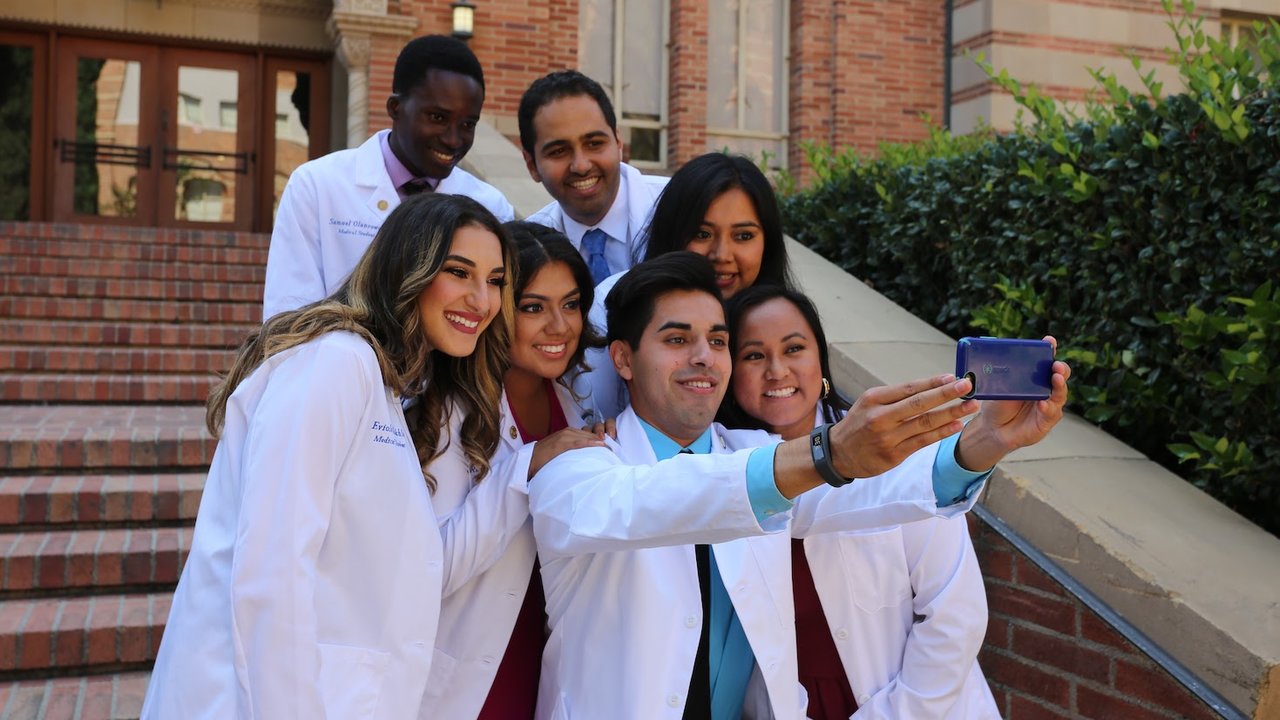
10 Best Medical Schools in Europe
Becoming a doctor is among the top five dream jobs for children . If you once dreamed of becoming a doctor or taking a course in the medical field, stick to those aspirations. Research shows that following your childhood dream career path makes your professional life more fulfilling. Plus, there’s something incredibly rewarding about being a doctor – perhaps it’s helping others, or perhaps it’s being part of leading the world in medical research.
Selecting the best medical school influences your success and achievements in the field. Read on to discover the best medical schools in Europe.
Why Should You Consider Medical Schools in Europe?
Europe has some of the best medical schools in the world. And you are certainly spoilt for choice. However, choosing the best medical school in Europe requires time and thorough background checks.
Before applying to a medical school, ensure it aligns with your career goals. Take time to study the teaching style, culture, and entry requirements, then narrow down to the best fit.
You should also check the chances of securing admission to your dream college as an international student, to avoid frustrations. This guide lists the top 10 medical schools to help you make an informed application.
1. The University of Oxford

The University of Oxford, UK, was named the world’s best university in 2023 , and became the first university to retain the title for seven consecutive years. Securing an admission to this prestigious university means you will learn from the best in the medical field. In addition, the medical school provides learner-centred teaching sessions, unmatched pastoral support, and comfortable accommodation for local and international students.
Given the high global ranking of the university, competition for the limited admission slots is high. However, you can increase your chances of getting into a prestigious medical school like Oxford, through an agency like China Admissions .
2. The University of Cambridge

Ranked second in the UK, the University of Cambridge is a good option for international students who wish to study in a high ranking university. Competition for admission slots to this school is not as high as in the University of Oxford.
When you secure an admission to this medical school, you get exposed to intellectually motivating and professionally challenging medical courses to prepare you for a successful career in medical practice.
You also experience a diverse culture that prepares you to work in any part of the world. The school has an acceptance rate of 15.7%, meaning you have a fair chance of getting an admission as an international student.
3. Karolinska Institute, Sweden

The Karolinska Institute (KI) is a medical research giant in Sweden and one of the most prestigious universities in the world. When you join KI medical school, you learn in an environment with students from all corners of the world. You also interact with world-renowned researchers working in a wide range of specialisations and approaches.
The research and training infrastructure in this school also meets international standards. However, most courses are offered in Swedish, apart from a Bachelor’s Programme in Biomedicine, which is offered in English. KI has an acceptance rate of 3.9% for international students.
4. Charité – Universitätsmedizin Berlin, Germany
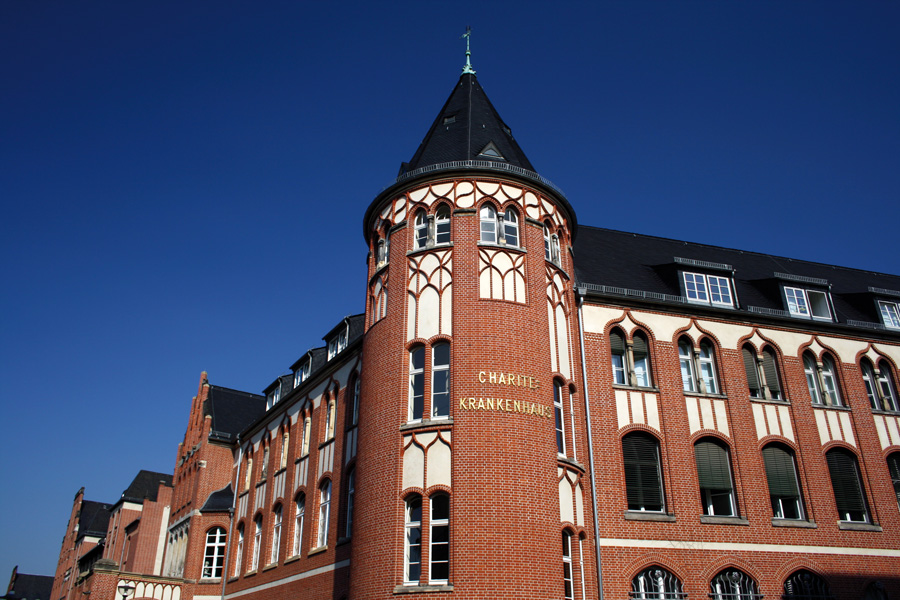
The Charité – Universitätsmedizin, Berlin , is a renowned medical school in Europe. The college holds over 50% of all Nobel Prizes in physiology or medicine.
It is also home to one of the best hospitals in Europe, which provides students with a practical approach to medical training. Moreover, studying medicine in Germany is cheaper than in the UK for international students. You may also choose to start your practice in the country after completing your undergraduate studies.
The school does not make public its acceptance rate, but there are hundreds of international students at the institution.
5. LMU Munich, Germany
The LMU Munich, Germany , provides numerous research opportunities for its students. You could also secure third-party funding for your medical research done in the institution.
In addition, the training is founded on centuries of medical research. The 10% acceptance rate means you have a fair chance of studying medicine at this prestigious university as an international student.
6. ETH Zurich, Switzerland
ETH Zurich, Switzerland , has built its reputation in medical training for the last 150 years. The medical school trains local and international students, equipping them with the knowledge to work anywhere around the globe. Your application to this university as an international student has a 27% success rate.
7. KU Leuven – University of Leuven, Belgium

KU Leuven – University of Leuven, Belgium, provides you with an excellent opportunity to meet your career goals in the medical field.
Once you secure admission to this university, you will be equipped with innovative research and clinical knowledge to help you meet your career goals. The KU Leuven – the University of Leuven trains local and international students and has an acceptance rate of 73%.
8. Erasmus University, Rotterdam, the Netherlands
The Netherlands also hosts medical schools with a regional and global reputation. If you wish to study for your medical degree in the Netherlands, Erasmus University Rotterdam will make your dreams come true.
With an acceptance rate of 39.1%, you stand a chance of joining other students pursuing different medical courses at Erasmus University, Rotterdam.
9. Sorbonne University, France
Sorbonne University, France , is among the few esteemed universities in Europe that accept everyone who meets their minimum qualifications. You can join thousands of other students benefiting from some of the high-level research facilities at the university.
10. University of Paris, France

The University of Paris also accepts almost every student that meets its minimum qualifications. Like most medical schools in the European region, it has invested in research and training facilities that equip students with the required skills and competencies to meet medical challenges in Europe and the rest of the world.
Want to Study Medicine Abroad? Contact Us
Europe has numerous renowned medical schools that provide internationally accepted training and certifications in the healthcare industry. Getting your medical degree in Europe helps you fulfil your childhood aspirations of helping humanity. You also spend fewer years in class compared to other regions, such as the US. However, competition for admission slots is stiff, especially when you make applications on your own.
At Global Admissions, we make it easy for international students to secure university admissions abroad. If you wish to pursue your medical degree abroad, visit our admissions page to learn more .

- Browse All Programs
- Universities
- Work & Internship Guide
- Online Events & Classes
- Global Scholarships Guide
- How to Choose a Major?
- Eligibility and Document Requirements
- Safety Guide to Studying Abroad
- All Articles
- Our Services
- Global Admissions Reviews
- Book a Call

Oops! We could not locate your form.
Username or email *
Password *
Forgotten password?
[email protected]
+44 (0)20 8834 4579
Study Medicine In Europe
With many European Medical Schools teaching Medicine in English, it's never been easier to study Medicine abroad. Find out more with this guide to studying Medicine in Europe.
Studying Medicine In Europe
- Find out why Europe is a good option
- Discover what studying Medicine in Europe costs
- Check what entry requirements you need
- Deciding on Medicine
- Work Experience
- Choosing a Medical School
- Personal Statement
- Interview Guide
- Interview Questions
- NHS Hot Topics
- Medical Ethics
- Graduate Entry
- Studying Abroad
Returning To The UK After Studying Medicine In Europe
- Study Abroad – Case Study
- Studying Abroad in the USA
- Study Abroad in Ireland
- Study Medicine In The Caribbean
- Study Abroad in Australia
- Study Abroad in Hong Kong
- How To Survive Your First Year Of Med School
- Science Hot Topics
- Veterinary Medicine
- Allied Health
- Physician Associate
- The NHS Guide
- Parents’ Guide
Medicine in the UK gets more competitive every year. This might get you looking towards Europe as a possible destination for your future Medicine studies.
Why Study Medicine In Europe?
Choosing to study Medicine abroad is a great way to get a place on a Medicine programme if you weren’t successful in the UK.
In particular, studying Medicine in Europe offers a number of benefits:
- Many courses are taught in English
- Tuition fees are comparable with the UK
- Cost of living in some EU countries such as Cyprus, where the University of Nicosia offers its popular MD degree , is significantly lower than the cost of living in the UK
- Graduates can usually apply for a licence to practice with the GMC
- Some universities such as the University of Nicosia are listed in the World Directory of Medical Schools and are also listed in the UK GMC website
As well as more obvious benefits that come with the lifestyle of studying abroad in Europe, like the cultural experiences, meeting different people and learning about different healthcare systems.
Is Studying Medicine In Europe Right For Me?
Studying Medicine in Europe is a good option for some, but won’t be right for everyone. It should not be considered an ‘easy’ option.
Take the quiz to see if studying abroad would suit you.
You will be signing up to studying a challenging degree in another country for six years of your life. You will also be learning the language of the country you are studying in, because, while your studies and exams are in English, you will be communicating with patients in their native language. The University of Nicosia, for example, offers free Greek classes to all Medical School students to help them learn the local language, even though English is widely spoken everywhere.
You will also have to finance your studies and living costs with limited access to student finance.
Discover University Of Nicosia Medical School
99.8% of graduates are practising in top hospitals around the world!
Are European Medical Courses Taught In English?
There are many European Medical Schools that teach in English. These include:
- University of Nicosia Medical School, Cyprus
- Plovdiv Medical University, Bulgaria
- Charles University in Prague, Czech Republic
- Palacky University, Czech Republic
- Masaryk University, Czech Republic
- Riga Stradins University, Latvia
- Debrecen University, Hungary
- Lithuania University of Health Sciences, Lithuania
Medical Doorway provides free advice to students aiming to Study Medicine in Europe for every single one of its partner universities listed above.
Entry Requirements At European Medical Schools
If you’re considering studying Medicine in Europe, it’s important you understand the entry requirements first, as they’re different from the UK.
For example, the A-Level grade requirements may be lower in Europe: you might be able to apply if you have ABB. You probably won’t need to sit the UCAT or BMAT – but there may be an alternative admissions test.
If you’re applying to the University of Nicosia Medical School, the entry requirements for their popular six-year MD (Doctor of Medicine) programme include:
- ABB, to include Biology and one of either Chemistry, Physics or Maths, and one more subject
- Non native English speakers have to submit an English proficiency exam such as IELTS with a 6.5 overall, or TOEFL iBT with 79 overall or iGCSE in English with grade 5
- No admissions test is required
- Pass an online MMI
Find Out More About University of Nicosia
Register now for their upcoming Medicine Open Days
Fees & Funding For European Medical Schools
The cost of studying Medicine in Europe varies greatly. Many universities charge fees comparable to that of home students at UK Med Schools – but the amount is different with each one. The cost of living is often lower in Europe – particularly in Cyprus, where UNIC Medical School is based.
Their tuition fees are €18,000 (~£15,000) for each of the first three years and €22,000 (~£19,000) for each of the last three years.
For international students outside of the UK, choosing a European Med School like the University of Nicosia Medical School can slash the cost of studying by up to 60%. That’s because some UK universities charge international students more than £40,000 a year for tuition, in comparison to the figures outlined above.
At UNIC Med School you can also get a scholarship up to 20% of tuition for the duration of your studies, and are granted based on the financial needs of your sponsor(s). Speak to their admissions department for some detailed information based on your personal circumstances.
How To Find Out More About Studying Medicine In Europe
The best way to find out more is to speak to Medical Doorway , or if you’re considering the University of Nicosia then you can apply directly. It’s also a good idea to sign up for Open Days at a number of European Medical Schools. You can see all future Open Days at the University of Nicosia Medical School here .
Take a look at our case studies to hear from two UNIC Medical Students about their experiences of studying Medicine in Europe .
Prep Packages
Get the best prep at the best price. Save up to 25% with prep packages for UCAT or Interview. Plus a new range of exciting medical experiences.
Trusted Courses
Our courses are trusted by world-leading schools and thousands of aspiring medics every year. 5*-rated UCAT and Interview Courses are available in person or live online.
1-2-1 Tutoring
Need one-to-one help? Our Doctor-trained Medicine tutors are ready to help you boost your UCAT score, nail your interviews and get you into Medical School.
Join Our Newsletter
Join our mailing list for weekly updates and tips on how to get into Medicine.
Studying Medicine Abroad
Loading More Content
FREE Webinar on 2nd May
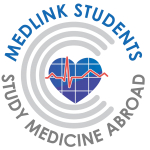
Join our FREE webinar on 2nd May 2024

Find Universities with:

Study Medicine in Europe in English
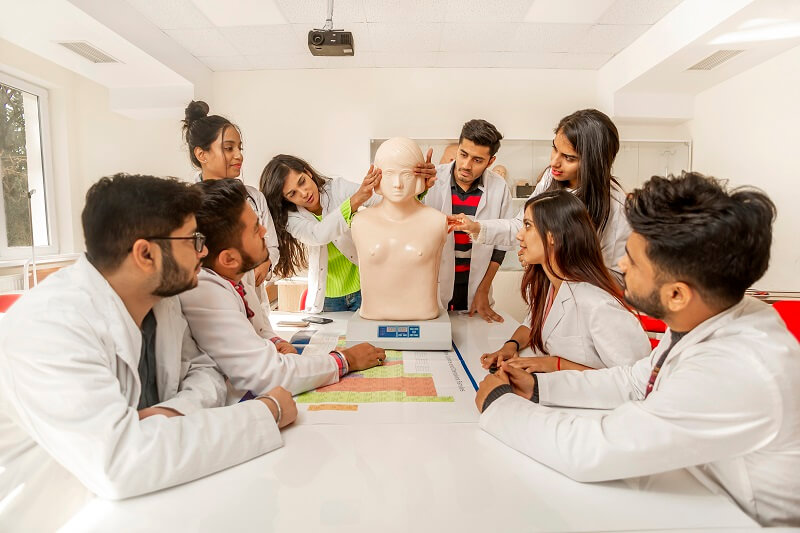
Why Pursue Your Medical Education In Europe?

Schedule A FREE Consultation With An Expert Student Advisor
Why study medicine abroad in english.
Studying medicine abroad expands students’ horizons both in an educational and cultural sense. Furthermore, aspiring doctors acquire self-reliance, discipline, and maturity as part of living in a foreign country. Consequently, international students gain a competitive edge in the job market thanks to their distinct backgrounds and skill sets.
For the past 20 years, it has become increasingly popular for aspiring doctors to study medicine in Europe in English. For some, the life-changing decision to study medicine abroad is the highly competitive admission requirements in their home countries. Other applicants meet the entry criteria but are forced to seek medical education in Europe because it’s more affordable.
Whatever your case, studying medicine in Europe should not be looked down upon or considered an alternative career pathway. The truth is that medical schools overseas offer the same high-quality education and facilities and are recognised by health organisations worldwide. This means you will be eligible for a career in medicine anywhere in the world.
What Are the Entry Requirements to Study Medicine in Europe?
The European universities that teach medicine in English are located in over 40 countries. Each of these universities has its own unique set of entry requirements. The only criterion of acceptance they all share is English language proficiency.
Other than that, you may have to sit an entrance exam in Biology, Chemistry, Physics, or Mathematics. Some exams will be simple multiple-choice questions, while others can be open questions or a combination of both. They may or may not consider your high-school science subjects grades.
There are hundreds of medical universities abroad, so entry requirements will always vary. The most common entry requirements for medicine in Europe are:
- BTEC, GCSE, or equivalent high school diploma
- Satisfactory grades in Chemistry, Biology, Maths, and Physics
- English language proficiency
- Entrance exams in Biology, Chemistry, and English (options for online testing)
- A simple online interview to check your motivation for choosing your vocation
- Letter of recommendation or personal statement (optional)
- You must have a passport
- Some universities require entry fees upon acceptance to make sure the seat will be taken
Whether you meet the entry requirements for medicine abroad, we can always guarantee entry into medicine or dentistry in Europe . Contact us , tell us what you are looking for in terms of medical education, and we will give you free options tailored to your preferences.
How Much Does It Cost to Study Medicine in Europe?
Depending on which country you choose to study medicine abroad, annual tuition fees can range from €3,000 to €30,000. These prices depend solely on the economic state of the corresponding country. More expensive options don't mean better quality of education because medicine is taught and learned the same everywhere.
Here are the general guidelines for the cost of studying medicine in Europe:
- Georgia and Serbia are the most preferred and affordable options, with tuition fees starting from per year.
- In the middle, Romania, Bulgaria, Poland, and other countries from Central and Eastern Europe have annual costs of - .
- Italy, Turkey, Cyprus, and Germany fall into the higher price range of €15,000 and above per year.
For a complete price comparison, check out our extensive list of medical universities in Europe . You can find detailed information about countries, programmes, tuition fees, living costs, curricula, and much more.
Meanwhile, here are the Top 5 universities to study medicine abroad at a low cost:
- Tbilisi Medical Academy -
- European University in Tbilisi -
- Trakia Medical University -
- University of Nis -
- Medical University of Silesia -
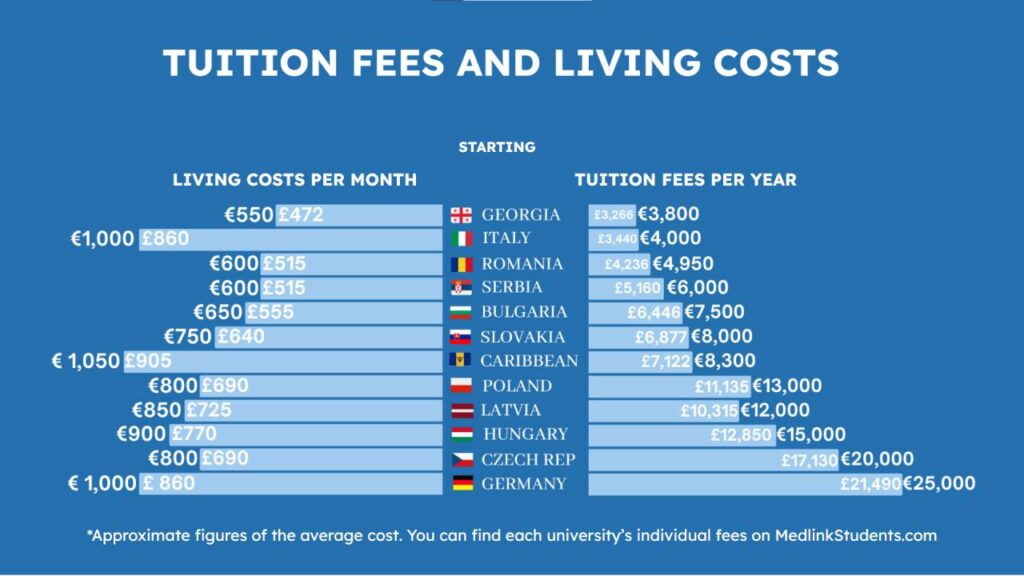
Where Are the Medical Degrees Recognised?
All of our partner universities are recognised by the World Health Organisation and listed in the World Directory of Medical Schools , which in most cases, is a primary degree recognition requirement.
Other common requirements include a course duration of at least 5,500 contact clock hours of study over a period of at least 3 or 4 years.
Medical degrees obtained from a European school will be recognised by the major medical councils worldwide. We've thoroughly researched and vetted these universities to ensure they comply with the best teaching quality standards. Graduates will be eligible to apply for a Doctor's licence in the country of their choice.
For example, you will be eligible to take the USMLE for the USA, the MCCQE for Canada, the PLAB/UKLMA for the UK, the PRES for Ireland, and the AMC clinical examination for Australia.

Where Can You Study Medicine In Europe In English Without An Entrance Exam?
The majority of universities in Europe have Biology and Chemistry entrance exams as part of their admission requirements. There are, however, several which require no entrance exams:
- Tbilisi Medical Academy - Georgia
- European University in Tbilisi - Georgia
- Carol Davila University of Medicine - Romania
- University Of Medicine & Pharmacy Craiova - Romania
- Oradea Medical University - Romania
- Medical University Of Bialystok - Poland
- Medical University Of Lublin - Poland
- Wroclaw Medical University - Poland
- Acibadem University - Turkey
- Riga Stradins University (RSU) - Latvia
- All 3 medical schools in Cyprus
Why Study Medicine in Europe?
You might have scored low on your entrance exam in your home country. Or perhaps you couldn’t afford the inflated tuition fees universities require nowadays. Don’t fret because beyond your home country lie excellent education opportunities for you to grasp in Europe.
There are countless reasons why one should consider studying medicine in Europe. It’s not only about the financial side of things or your state’s strict regulations and protocol. Europe is rich in diverse nationalities with their own cultures but also different educational systems. So, in addition to pursuing your dream of becoming a physician, you have a perfect “excuse” to explore the world!
We are leaving the exploration part for you, and we will now outline the top reasons why you should choose to study medicine abroad in English.
1. Globally recognised medical degrees
The medical degree you get when you graduate from a European university is recognised by the World Health Organisation and Medical Councils worldwide , including in the UK, USA, Canada, Ireland, Australia, the Middle East, Western Europe, and more. This automatically enables you to practise as a doctor in your home country or anywhere in the world.
2. Wide variety of options
There are hundreds of leading medical schools in Europe that teach in English and are open to international students. You will rarely see a reputable university that doesn’t have an English programme. This means you have the complete freedom to choose your desired destination according to your specific requirements.
3. Less competition for entry
Having an abundance of options to pursue medical education in Europe means that there will be less competition for entry. You will be in a different bracket where you will not compete for places with the local applicants.
4. Unlimited university applications
You can apply for an unlimited number of medical schools abroad simultaneously, while in the UK, for example, you can only apply for a maximum of 4 at a time. Should you not get accepted into any of them, you would have to wait a year before trying again.
5. No complicated entrance exams
There’s no equivalent to the UMCAT, GAMSAT, BMAT, or any other irrelevant and complicated exam in Europe, so those are out of the list. You are only required to pass an entry test in Biology and Chemistry and a simple interview to evaluate your motivation to enter the world of medicine.
6. You can apply without an entrance exam
In many European universities, you can enroll in medicine without having to go through the hassle of an entrance exam. The European University of Tbilisi in Georgia is a brilliant example.
7. Affordable tuition fees and living costs
Tuition fees in most European countries, especially in Eastern Europe, are significantly lower than those of Western Europe or North America. For example, you can find a university in Georgia that charges per year, or one that will cost you - per year in Romania or Bulgaria.
Bear in mind that the lower tuition fees DO NOT compromise the quality of education. Prices are determined based on geographical and economic factors and have nothing to do with your studies. This is also why the cost of living in Europe is lower, and your living expenses will hardly ever exceed €300 – €600 per month.
8. International student environment
European medical universities that offer English-taught programmes have already established international student communities from the UK, the US, Canada, the Middle East, Germany, and many more. We assure you that you will not feel alone on this journey, and you will also have us to guide your every step and support you.
9. Modern facilities and teaching technology
Overseas modern medical facilities teach with top-notch technology, have rich medical libraries that you can access anytime, fully equipped laboratories, university teaching hospitals, and much more.
10. Ability to return home and practise as a physician
Since your medical degree will be recognised worldwide, you will be able to return home and practise your dream profession right away.
How to Gain Admission in Europe?
A wide variety of universities in Europe teach medicine in English, distributed between over 40 countries. Each of these universities has its own unique set of entry requirements. The only criterion of acceptance they all share is English language proficiency.
Certain universities may interview applicants to evaluate their motivation to study medicine.
Request a FREE consultation with one of our expert advisors. They will be able to give you tailored advice on universities, living abroad, and much more.
Where to Study Medicine in English in Europe?
There are more than 100 medical schools in Europe where you can study medicine in English. Some of the most popular destinations are Georgia, Bulgaria, Romania, Serbia, and Poland.
For detailed reviews and information on the best medical universities in these countries, you can check our universities page .
There you will find an extensive, ever-expanding list of prestigious universities with their yearly tuition fees and courses. Alternatively, you can skip hours of research and contact a Medlink Students advisor to consult you on your options for FREE.
How Are Medical Courses in Europe Structured?
Medical courses in Europe are aimed at fresh high school graduates who can apply right after their GCSEs, A-levels, or the 12 grade equivalent of countries worldwide. Medical schools abroad offer English-taught programmes and have dedicated places for international students each year.
There is no need to take a gap year, gain experience, or shadow a doctor before applying. European medical schools will accept you right away as long as you meet the admission requirements.
English taught Medicine in Europe takes 6 years to graduate. The course includes 3 years of theoretical subjects and 3 years of practical knowledge and experience. The academic studies include subjects such as Anatomy and Pathology, the building blocks of the profession.
These are necessary for proceeding to the next stage of your education - applying your knowledge in practical training sessions and interactions with patients in hospitals, also known as clinical rotations.
The course sizes in Europe usually range from around 50-200 students depending on which university you choose. You’ll typically study in small groups of about ten for seminars, so you will get many opportunities to learn and practise your skills.
You will graduate as a Doctor of Medicine. Moreover, you will be able to start working in hospitals as a junior doctor right away.
Which are the Best Medical Schools in Europe?
The top 10 medical universities in Europe that teach in English are:
- Tbilisi Medical Academy in Georgia - per year
- European University Tbilisi in Georgia - per year
- The University Of Nis in Serbia - per year
- Sofia Medical University in Bulgaria - per year
- Plovdiv Medical University in Bulgaria - per year
- The Medical University of Silesia in Poland - per year
- The Medical University of Bialystok in Poland - per year
- Carol Davila University in Romania - per year
- Titu Maiorescu University in Romania - starting from per year
- The Semmelweis University of Medicine in Hungary - per year
How to Study Medicine Abroad?
Studying medicine abroad is a relatively straightforward process, though this doesn’t make it any easier. Here is a step-by-step guide to achieving your educational dreams:
- Select a suitable university in Europe taught in English with good accreditation.
- Apply for admission by following the university’s guidelines.
- Gain admission to the university by covering all the entry requirements, including educational qualifications, exams, and interviews.
- Apply for a visa with the country’s embassy or consulate.
- Prepare for your first journey to the university by planning and packing all the necessities.
- Register for classes and pay any tuition fees.
- Study for classes, learn from your mentors, and lead a balanced life.
- Have the time of your life.
- Repeat steps 6-8 for 3 to 6 years, depending on your programme.
You Can Also Study Medicine Online
In 2020, we introduced the online medical course for years 1 to 3 in collaboration with our partner universities. You can study pre-clinical subjects of medicine from the comfort of your home with the option to switch to physical attendance anytime.
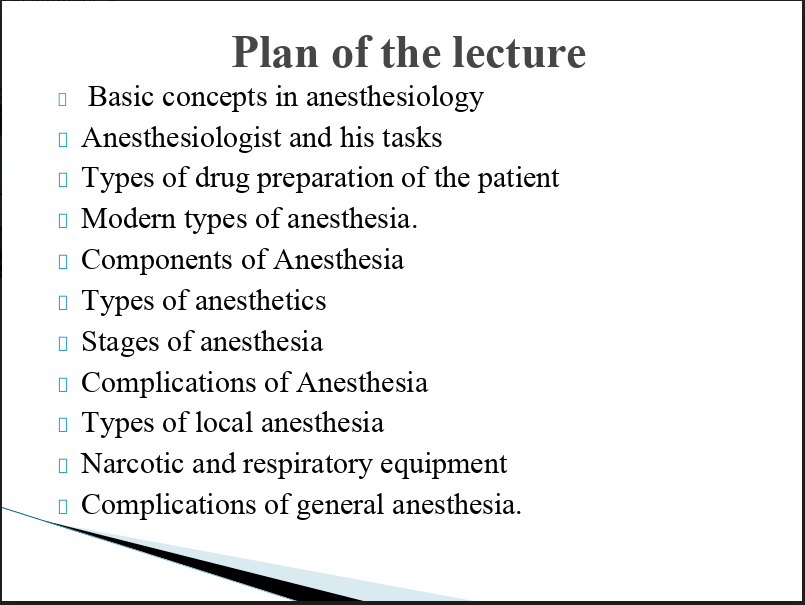
Graduate Entry Routes Available in Europe
There are numerous accelerated routes for students who have studied science or health-related disciplines at the undergraduate level. Students are eligible to enter a fast-track graduate-entry dentistry or graduate entry medicine route in Europe if they hold any type of higher education diploma.
These options are usually 4 or 5 years long and depend on previous qualifications and subjects studied there. Most students who apply for the graduate entry pathway have studied Biomedical Sciences, nursing or any similar programme .
Can You Transfer to Medical Schools in Europe Taught in English?
Several medical universities allow students to transfer their credits , meaning they can continue studying for the next consecutive year at a different medical university without being held back from moving.
Why Schedule a FREE Consultation with Medlink Students?
Medlink Students is the leading international agency for studying medicine abroad in Europe. Thousands of students trust us each year with professional advice, handing their documents, and helping them secure a seat at top universities overseas.
Whether you’re an undergraduate student or a bachelor’s degree holder, you can schedule a call with one of our expert advisors. We will not charge you for the assessment of your documents and the consultation. The tailored advice you will get is based on your preferences about countries, universities, tuition fees, accreditation, accommodation, leisure time, and other criteria.
We collaborate closely with all our partner universities, so any claims we make will be firm. We promise 100% guaranteed admission into a medicine course abroad.
Medlink Students' comprehensive service has over 30 contractual obligations, including:
- Pre-application guidance and liaising on your behalf
- Expert completion of the application process
- Help you settle abroad, starting with a free airport pick-up
- Assistance with the GMC registration process in the UK
Schedule a FREE consultation now to discover your options in Medicine.
Filter, Compare, And Select The Best Medical University For You
Study medicine in georgia.
Georgia is located at the crossroads between Europe and Asia. It offers an excellent education at affordable annual tuition fees. One of the most attractive destinations for students looking to study medicine or dentistry is Georgia .
Petre Shotadze Tbilisi Medical Academy and European University of Tbilisi currently hold the title of the best medical universities in Georgia.
While it may not seem like the obvious destination at first, Georgia has become very popular with Western students looking to study medicine. What attracts them is not just the low expenses but also the world-class medical education from well-established universities.
Tbilisi is the capital and largest city of Georgia, lying on the banks of the Mt’k’vari River. This is where most of Georgia’s universities are located, and because of that, the city sports a large number of international students.
Study Medicine in Poland
Studying medicine in English in Poland is similar to the countries above, but it’s geographically located more toward central Europe. Some of the most popular medical universities include Bialystok Medical University in Poland. The course is extremely competitive due to the high number of applicants. The MD degree is six years long and contains a lot of clinical experience.
Admission usually depends on your grades in only two of the following subjects: Biology, Chemistry, Physics, and Maths in A-levels or the final school certificate(s). Afterwards, the university will usually request to interview the candidate via Skype. The term dates are from the 1st of October till the 16th of June.
Bialystok is very accessible for international students. You can get a direct flight to Warsaw Airport in the capital, then a short coach journey or train journey to Bialystok. Halls or dormitories cost around 85 Euros per month. Other universities also teach medicine in English, such as Warsaw Medical University in the busy city of Warsaw.
A popular option for British students is Silesia Medical University in Katowice due to the higher number of UK students there. This university offers 4-year graduate entry medicine for students who hold a Bachelors degree.
Study Medicine in Bulgaria
Bulgaria is also an affordable option, with most medical universities charging yearly tuition of . One of the schools in Bulgaria, known as Varna Medical University , is situated on the Black Sea coast.
The universities in Bulgaria have continually evolved and improved their faculties, which is one of the reasons many international students decide to study medicine in Bulgaria every year.
Bulgaria's admission requirements are flexible, and many students apply. Hence, it’s essential to have a competitive file. Candidates go through a competitive Biology and Chemistry test to determine their academic ability.
Medlink Students helps students with relevant entrance test materials to maximise their chances of successfully passing the exams. All the universities in Bulgaria share similar standards. Students are usually attracted to Sofia Medical University due to its rising reputation and ideal location in the capital. Varna, Sofia and Plovdiv are most popular with international students studying medicine or dentistry in Bulgaria.
Plovdiv Medical University is ideal for those who don’t mind a 1-hour ride from Sofia airport. Plovdiv does have an airport, but flights to it are not as frequent as flights to Sofia. Plovdiv is a small city, but it is one of Bulgaria's oldest towns and offers a few malls and ancient artefacts. The advantage of studying in Plovdiv is that everything is within walking distance.
Pleven Medical University has a February intake only instead of the usual September intake at the other universities. Trakia University is located in a town called Stara Zagora. It is a small faculty in a medium-sized city about 3 hours away from Sofia Airport. Trakia University is also one of the few universities in Europe to study veterinary medicine in English .
Bulgaria's living costs are low, and usually, students can live comfortably at about €300-400 per month.
Study Medicine in Romania
Many students flock to study medicine in Romania due to its affordable fees compared to other European medical universities. Schools here boast a fantastic reputation due to the advanced technological resources, skilled teachers, and a long history of teaching international students in English and French.
Schools like the Carol Davila University of Bucharest have tuition of around per year. The Titu Maiorescu University of Bucharest offers both medicine and dentistry courses, yet still has a reasonable tuition fee of per year for EU students and €9500 per year for non-EU students.
Bucharest is a vibrant city populated with professors at the top of their fields. Students who would like to save money tend to consider universities located outside the capital. Craiova city, home to Craiova Medical University , is an affordable option with annual tuition of and lower living costs.
Students tend to apply for admission at these three Romanian universities more frequently.
Generally, students who decide to study in Romania and graduate will have worldwide work opportunities. Doctors trained in Romania have a reputation for excellent clinical skills in the UK and around the world in general.
Study Medicine in Hungary
The medical schools in Hungary have appeared on the European scene over the past several years as one of the most popular options for international students, and for a reason. To make learning more exciting and satisfying, they use new interactive technologies and techniques. Not only that, but in comparison to medical schools in the UK, tuition fees are far more attractive. Living expenses are also on the low-end, as you would probably guess.
One of the best schools in Hungary is the Debrecen University Faculty of Medicine . It was established only a month before the end of WW1, making it the first medical school on campus in Central Europe. In 1951, it became an autonomous institution, and, ever since then, it has had a long-lasting reputation as one of Hungary’s finest universities.
The Semmelweis University of Budapest is another great English teaching medical school in Hungary. The Faculty of Medicine of the University of Semmelweis, established in 1769, is the oldest and largest faculty with over 4,500 students, making it one of the most successful on the continent. It is considered to be the best medical university in Hungary.
Study Medicine in Slovakia
Pavol Jozef Šafárik University ’s Faculty of Medicine in Kosice, Slovakia, has rapidly become a popular destination for studying medicine or dentistry in English. This is due to the high standard of teaching and the rising reputation of the medical universities in Slovakia .
This large faculty has been teaching for 65 years and channels all its comprehensive experience into training some of the world’s most skilled doctors. The big city of Kosice offers a vibrant and lively lifestyle with activities for everybody. In addition to its world-renowned teaching, the university provides scientific research opportunities to enthusiastic students.
The city offers the most extensive botanic garden and zoo, lots of sightseeing areas, restaurants, busy high streets, modern malls, engaging nightlife and many more. The university is located 12-minutes from the Kosice International Airport, making it convenient and accessible.
The tuition fees for the medical course are €10,000 per year, while the dental course is about €11,000 per year . Another reason students choose to go to Slovakia is due to its very affordable living costs .
Study Medicine in Germany
Germany is undoubtedly one of the world leaders in medical education. However, medicine in Germany is taught only in German, so you will have to learn the language before going there.
Luckily, Medlink Students has partnered with one university that recently started promoting English courses, and that’s the University of Targu Mures Medical Campus Hamburg (UMCH) . The tuition fee starts at per year, and after finishing the second year, you have the choice to remain in Hamburg and pay €28,000 per year or go to Targu Mures in Romania, and continue your education in English, but pay only €6,000 per year.
Study Medicine in Turkey
The Acibadem University in Istanbul is one of the rising stars on our list. There you can study a number of health-related sciences, most notably medicine and pharmacy, in English .
The tuition fees per year are for medicine and €13,700 for pharmacy. Acibadem University attracts international students from all around the world due to considerable investments in modern technologies and training centres.
Study Medicine in Cyprus
Near East University in North Cyprus initiated the medicine program in English in 2008 and the Dentistry program in 2007. The initial three years focus on pre-clinical education. Therefore, in the fourth and fifth years, the students are trained in clinics where group studies are carried out. The sixth-year is the internship year. Near East University ranks first in Cyprus .
An alternative medical faculty is the University of Nicosia Medical School which runs a relatively young private 4-year MBBS course for a hefty tuition fee of /year. This university is fairly new to teaching medicine in English; hence it’s still finding its feet on the ground. The university is currently most popular among Greek students compared to any other nationality simply because English is not a commonly spoken language in Cyprus. As the years go by, maybe the university will gain more experience and become a more suitable destination for international students.
Study Medicine in Italy
A few medical universities in Italy teach medicine in English: Bari BEMC, Bologna, Milan International Medical School , Naples – Federico II, Naples Luigi Vanvitelli (SUN), Pavia – Harvey, Rome La Sapienza and Rome Tor Vergata, Turin/Turino IMS. The University of Siena is the only university to teach Dentistry and Dental Prosthodontics in English. Nevertheless, Italy is still a popular option for students who decide to enrol in medicine in Europe.
The tuition fees are around €4,000 per year, with some small discounts for EU students with low family income. However, their entry requirements are very complicated, and the number of applicants is much higher than the number of places available. Usually, around 3500-4000 international students apply for 204 places in Italy.
Public universities currently select students using the IMAT exam (a similar international version of BMAT). The IMAT exam is fairly difficult and not easy to prepare for. The exam usually takes place in September, and the candidates’ results are ranked in October.
It might be easier to achieve medical admission in private universities in Italy. However, their fees are slightly higher (€6,850-€20,000 per year), but they are also means-tested and can offer financial aid in some cases. It usually costs EU students around €10,000 per year. Private universities in Italy include Cattolica Univesity, which has 20 EU places, and 30 non-EU places, and tuition range from 7,000€ to 16,000€. The more popular destination is Humanitas Medical school which has a more accessible version of the IMAT for EU and non-EU students and tuition fees of about €10,000– €20,000 per year. San Raffael International University has the highest tuition at €20,000 per year.
Study Medicine in Serbia
Serbia is considered to be among the best destinations for international medical students. Those who wish to study medicine in Serbia will find old, historic universities, many of which are located in smaller, quieter cities. Nis and Novi Sad, for example, have less than half a million citizens but are prime destinations for students from around the world.
Much like in other countries, the medical programme in English lasts 6 years: 2 years pre-clinical studies, 3 years clinical, and then an internship in the final year. The course is very competitive, with some English programmes (such as the University of Nis ) offering as few as 50 spots. This means that high grades in science subjects, as well as a good performance in the entrance exams, are crucial to being accepted in Serbia.
Students who prefer bigger cities to smaller ones will probably thrive in Belgrade, the capital, with a population of over 1.7 million people. Its local medical school, the University of Belgrade , hosts more than 100,000 students across its 31 faculties. It allows students to not only study medicine in English , but also dentistry and pharmacy, alongside pre-med courses.
Despite the competitive entry, there are many advantages to studying medicine in Serbia. All universities we work with provide world-class medical education and are accredited by the GMC, AMA and many more international organisations. Beyond that, both the tuition fees and living costs are very low, which allows students to study in Serbia and then return to practise in their home country, or anywhere in the world they wish.
Ready to Start Your Journey Abroad?
1702 students attended our 1st-year entry medicine in europe webinar. check it out.

- About Medlink Students
- Reasons to study in Europe
- Difference between UK and EU education
- Medical universities offering English courses
- Where are the degrees recognised?
- Tuition fees and living costs
- Admission requirements
- Entrance exams, grades
- Admission process
- How Medlink Students can help you
- Registration to practice in the UK and USA, and much more
- Current state in education - Brexit and more...
I did join a university in Ukraine, but then thankfully, with Medlink Students, I was able to transfer ... I've done my research, and with the help of Medlink Students I picked a great university which fits my budget ...I told them, look, this is black and white. I've got this much that I'm able to spend on tuition fees. Where can I go? They narrowed it down a lot. And then from there I was able to decide ..It was very easy because I dropped a message and then I was able to schedule a call and literally every question that I had was answered loud and clear. So I was happy with that. ... Then Medlink Students have arranged for me someone to pick me up from the airport to take me straight to the hotel where I booked it. So I wasn't very worried about that. As long as my safety was fine, I was fine. And they reassured that for me. That was amazing.

The experience was really amazing. At first, I was skeptical about how things will turn out, of course, because I was moving initially from Turkey to a new place, but with the help of Medlink Students, I found things very easy because I didn't have to stress about my application issues. I only had to deal with my own issues, like the visa processing and my traveling. But the rest was all catered for, so the journey was really smooth and I loved it. And they also made prior arrangements for me with a school I found really helpful because coming into a new country, you know nobody, you don't know where to start. They already had set, like, a full ground for me, so i can come in, settle in and kick off my journey.

... first of all, I cannot imagine this process of application process or transfer process without the help of Medlink Students. They have been very supportive since the first moment, helping me before, during and after I came here. Serbia, they picked me up at the airport. They helped me in the first day at the university in the registration, also with my papers for the residence permit, get a SIM card for my phone, also open my bank account, and they are always there, allowed to help me with everything I need, every doubt about the school or the city or any paper. So for me was a good experience and still be a good experience, because I feel like I have someone to help me every time I need it. That's great.

Frequently Asked Questions
There are more than 100 medical universities in Europe where you can study Medicine, Dentistry, Veterinary, and Pharmacy.
Tuition fees vary considerably depending on the university. For example, European University In Tbilisi Georgia charges just around per year, while the tuition fees at Acibadem University in Turkey are per year.
Absolutely, yes! There are more than 100 European universities that teach medicine in English. To learn more about them, check out the list that we created. It contains top medical schools in Europe that offer medicine, dentistry, pharmacy, and veterinary courses in English.
Medical education in Europe is 6 years.
Entry requirements for medical school vary highly depending on different universities. Some medical universities in Europe have entrance exams in Biology, Chemistry, and English others don't. However, for sure, you will need:
- High school diploma or an equivalent credential in your home country's high-school system
- Good grades in Chemistry and Biology and/or Math and Physics
Yes, but it's not just okay. It’s a perfect opportunity! Suppose you choose to study medicine in Europe. In that case, you will benefit from affordable tuition fees and living costs, flexible entry requirements, high-quality education, modern medical facilities, and a globally recognised degree.
Saved Universities

Discover Your Options Abroad With a FREE Consultation
Check your email, to book a free call, with an expert advisor.

free webinar: study medicine & dentistry abroad


The Association of Medical Schools in Europe (AMSE)
Mühlenstrasse 8a D-14167 Berlin Germany
e-mail: [email protected]
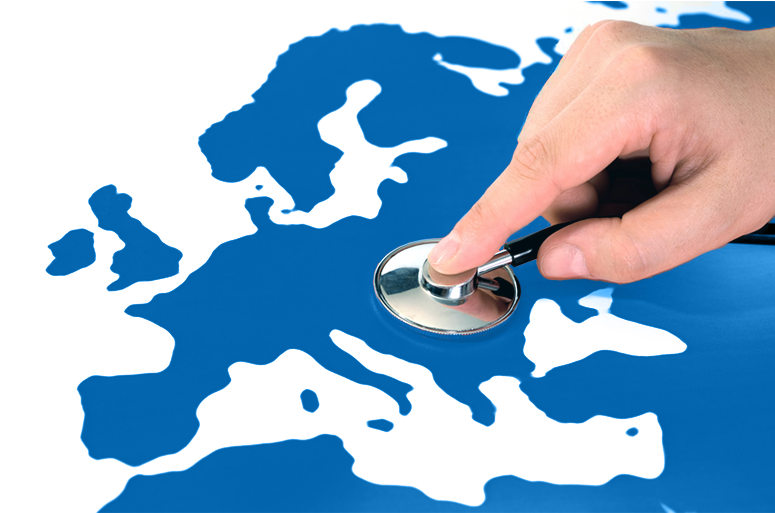
AMSE Newsletter – 2024 – No. 2
Amse newsletter – 2024 – no. 1, amse newsletter – 2023 – no. 11, conferences.

Annual European conference on assessment in medical education
10 Best Medical Schools In Europe Taught In English
This blog post explores various best medical schools in Europe taught in English. Have you been nursing the idea of attending any of them? Then, sit tight and read closely to find the one that best matches your interest.
No doubt, the school you attend contributes majorly to your career. If you enroll in any of the best medical schools in Europe , the chances of getting the in-depth and practical skills needed to thrive in the medical field are very high, which will in turn contribute to your career success.
What I am simply saying is that if you are studying medicine in the Netherlands , go for the best schools. Same with Hungary and any other place you can think of around the world.
Do you also know that there are veterinary schools in Europe taught in English ? Well, I just thought to point out that to you too in case your interest is in veterinary or you know someone who has been searching for it.
So, just like I said earlier, we will be exploring the various top medical schools in Europe taught in English. We will look at their tuition fees, duration, admission requirements, and many others. I urge you to follow me closely and read till the last sentence.
Check out this article on the best medical courses you can study and earn good pay . It will be of great benefit to you.

Best Medical Schools In Europe Taught In English
Here are the best medical schools in Europe taught in English. I will list and explain each of the schools for you to gain full insights. It is very important to note that our data is obtained from deep research about the topic.
- University of Nis
- Trakia University
- University of Medicine, Craiova
- European University in Tbilisi Georgia
- Carol Davila University of Medicine & Pharmacy
- Petre Shotadze Tbilisi Medical Academy
- Titu Maiorescu University
- Medical University of Bialystok
- Semmelweis University of Medicine
- Medical University of Silesia
1. University Of Nis
The University of Nis located in Serbia is the first on our list of best medical schools in Europe taught in English. It was established in 1965 and houses over 20,000 Serbian and international students. The school’s faculty of medicine has its program taught in English by industry experts.
Admission criteria include having a high score in biology and chemistry entrance exams, passing an interview that determines if you have a good command of English, etc.
Tuition fee: €6,000 annually
To apply, use the link below
2. Trakia University
The next on our list is the Trakia University located at Stara Zagora, Bulgaria. The school’s faculty of medicine focuses on giving practical training to all students interested in the medical field. It has its medicine and veterinary program taught in English.
Admission criteria include passing the biology and chemistry exams, and also English exams for those whose native language is not English.
Tuition fee: €7,500 annually (for medicine) and €5,100 annually (for veterinary)
Duration : 6 years for medicine, 5.5 years for veterinary
3. University of Medicine, Craiova
University of Medicine, Craiova is also one of the best medical schools in Europe taught in English. The school is situated in Craiova, Romania, and has its medicine and dentistry program taught in English. It is important to note that no entrance exam is taken, however, applicants need to present their biology and chemistry scores at high school.
Duration : 6 years for both medicine and dentistry.
To apply, use the link provided below
4. European University in Tbilisi Georgia
When looking for the best medical schools in Europe taught in English, European University in Tbilisi Georgia is another school to consider. They offer high-quality medical programs using its faculty of medicine since 2014. The programs done in the faculty are medicine and dentistry.
Eligibility criteria include possessing a high school diploma and being fluent in English.
Tuition fee: €5,200 annually (for medicine) and €4,200 annually (for dentistry)
Duration : 6 years for medicine and 5 years for dentistry.
Use the link provided below to apply
5. Carol Davila University of Medicine & Pharmacy
Carol Davila University of Medicine & Pharmacy offers standard medical programs to students who want to study medicine or dentistry in Europe taught entirely in English. The school is well-known for its prowess in the medical world. It is also regarded as one of the oldest medical schools you can see in Romania.
It is important to note that there are no entrance exams to take, however, applicants must have passed their biology and chemistry done in high school.
Tuition fee: €8,000 annually (for medicine) and €7,500 annually (for dentistry)
Duration : 6 years for both
6. Petre Shotadze Tbilisi Medical Academy
Another on our list of best medical schools in Europe taught in English is Petre Shotadze Tbilishi Medical Academy. This school focuses on providing adequate medical education to students who wish to study medicine in Europe entirely taught in English.
Admission requirements include possessing a school leaving certificate, passport, filled application form and letter, NEET exam result (for Indian students), etc.
Tuition fee: €6,800
Duration : 6 years
To get started, use the link given below
7. Titu Maiorescu University
Titu Maiorescu University is a private non-profit university established in 1990. It is located in Bucharest, Romania. The school’s faculty of medicine delivers its medicine and dentistry program entirely in English and is globally known for its excellence in medical education and research.
To enroll, you must pass your high school chemistry and biology, and also the basic entry exam in science and English.
Tuition fee: For medicine; €8,500 (EU students) and €10,000 (non-EU students). For dentistry; €7,500 (EU students) and €9,500 (non-EU students)
8. Medical University of Bialystok
The Medical University of Bialystok equips students with in-depth knowledge and skills needed to thrive in the medical field. It is one of the European medical schools that offers medicine in the English language. The school is located in northern Poland and is known globally for its prowess in medical education.
There may not be any entrance exam to gain admission into the school, however, your high school grades, and your performance at the interview will be used to evaluate if you are qualified.
Tuition fee: €13,500 annually
Use the link below to get started
9. Semmelweis University of Medicine
Another best medical schools in Europe taught in English is the Semmelweis University of Medicine. The school was established in 1769 and is situated in Hungary.
It provides students with all they need to know in order to thrive in the medical field, and the programs taught in English are medicine, pharmacy, and dentistry. Entry requirements include passing both the entrance exam and the interview.
Tuition fee: €16,400 annually (medicine), €17,200 annually (dentistry), €10,800 annually (pharmacy)
Duration : 6 years for medicine, 5 years for both dentistry and pharmacy.
10. Medical University of Silesia
Another on our list of best medical schools in Europe taught in English is the Medical University of Silesia. The school was established in 1948 and is regarded as the largest medical school in Poland.
The programs on medicine, dentistry, and pharmacy are entirely taught in English. Entry requirements into the school include passing the entrance exams, possessing a good grade in high school biology, physics, and chemistry, etc.
Tuition fee: €11,000 annually (medicine), €12,000 annually (dentistry), €8,000 annually (pharmacy)
These schools listed above are not just the best medical schools in Europe that teach in English but are also accredited. If you followed me to this point, I am sure that you must have picked out one or two of the schools that best matches your interest.
I wish you the best of luck as you apply.
Recommendations
- Easiest Private Medical Schools To Get Into .
- Best Free Online Medical Courses with Certificate .
- Cheap Universities In Europe That Teach In English .
- Medical Schools in Cyprus .
- Best Medical Schools In Romania
You must be logged in to post a comment.

Welcome to the Medical Education Pillar!

Vision and Mission
A Europe of the highest standards in healthcare education and continuous integration of medical curricula across the continent and a prosperous exchange of best practices in interprofessional education.
Empower medical students to be part of shaping an education, that responds to advances in medicine, new learning technologies and philosophy of education.
- Connect students and professionals passionate about teaching, learning and gaining new skills;
- Expand the educational scope by offering extra-curricular activities;
- Advocate for a continuous evidence-based development of medical education on a local and international level;
- Promote the exchange of information related to education through networking, conferences, publications and online activities;
- Empower medical students to be peer-educators;
- Collaborate with relevant partners in the implementation of objectives related to medical education.
Focus Areas
Transparency and conflict of interest in medical education settings.
Physicians face many conflicts of interest in daily medical practice. These conflicts of interest may be relating to the pharmaceutical industry, medical device industry, or individuals’ issues of intransparency. When these conflicts of interest are not declared in a medical education setting, medical students can unknowingly become influenced in their independent decision-making process.
EMSA is committed to ensuring a high ethical standard in medical education. Therefore we aim to advocate on this topic and ensure proper educational formats to combat conflicts of interest in medical education settings and strive for transparency.
You can read our policy paper on Conflicts of Interest in Medical Education Settings here for more background information.

EMSA- European Medical Students’ Association
Welcome to the official website of EMSA!
The European Medical Students’ Association – Association Européenne des Étudiants en Médecine (EMSA) is a non-profit, non-governmental organisation representing medical students from all across Europe.

STAY IN CONTACT WITH EMSA
Eurasian Centre for Accreditation and Quality Assurance in Higher Education and Health Care
- ABOUT ECAQA
- Mission Statement
- Organizational Structure
- AC Meetings
- ECAQA Expert Board
- Director General and Staff
- Constitution
- Strategic Plan
- Internal Quality Assurance System
- ECAQA Quality Assurance Programme
- ECAQA Partners
- Regulations
- Organizations of Postgraduate education and Continuing Professional Development
- RESIDENCY PROGRAMMES
- Doctoral Programmes
- College Programmes
- Master's Degree Programmes
- Bachelor's Degree programmes
- Accreditation Process and Procedures
- Institutional Accreditation
- Specialized (Programme) Accreditation
- The standards for accreditation of simulation centres
- Post-accreditation monitoring schedule and planning
- Post-accreditation monitoring reports
- Effectiveness of post-accreditation monitoring
- ECAQA’s process for Appeals and Complaints
- Institutional accreditation for continuing education organisations (continuing professional development)
- Partnership
- International Projects
- International external evaluation of ECAQA
- About Accreditation
- Students Involvement
- Students And Quality Assurance Policy In Education
- UPCOMING EVENTS
- PAST EVENTS
- Responses and Recommendation letters
- Submit an application
The Association for Medical Education in Europe (AMEE)
Ronald Harden AMEE General Secretary/Treasurer 12 Airlie Place Dundee DD1 4HJ United Kingdom
The Association for Medical Education in Europe (AMEE) is a worldwide organisation with members in 90 countries on five continents. Members include teachers, educators, researchers, administrators, curriculum developers, deans, assessors, students and trainees in medicine and the healthcare professions.
AMEE promotes international excellence in education in the healthcare professions across the continuum of undergraduate, postgraduate and continuing education. AMEE, working with other organisations, supports teachers and institutions in their current educational activities and in the development of new approaches to curriculum planning, teaching and learning methods, assessment techniques and educational management, in response to advances in medicine, changes in healthcare delivery and patient demands and new educational thinking and techniques.
AMEE promotes excellence in medical education internationally by:
- Promoting the sharing of information through networking, conferences, publications and online activities;
- Identifying improvements in traditional approaches and supporting innovation in curriculum planning, teaching and learning, assessment and education management;
- Encouraging research in the field of healthcare professions education;
- Promoting the use of evidence-informed education;
- Setting standards for excellence in healthcare professions education;
- Acknowledging achievement both at an individual and an institutional level;
- Recognising the global nature of healthcare professions education;
- Influencing the continuing development of healthcare professions education through collaboration with relevant national, regional and international bodies.
Links to international networks on medical education and accreditation:
- World Federation for Medical Education (WFME) ;
- The European Network for Quality Assurance in Higher Education – ENQA ;
- The International Network for Quality Assurance Agencies in Higher Education (INQAAHE) ;
- The Asia-Pacific Quality Network (APQN) ;
- Association of Quality Assurance Agencies of the Islamic World (AQAAIW) ;
- Central and Eastern European Network of Quality Assurance Agencies in Higher Education (CEENQA) ;
- The Association for Medical Education in Europe (AMEE) ;
- The Association for Dental Education in Europe (ADEE) ;
- The Assocation of Medical Schools in Europe (AMSE) ;
- ORPHEUS (Organisation for PhD Education in Biomedicine and Health Sciences in the European System.) is an association of European biomedical and health science faculties and institutions ;
- European Alliance for Subject-Specific and Professional Accreditation and Quality Assurance (EASPA) ;
- National Assessment and Accreditation Council (NAAC) India ;
- European Quality Assurance Agency (EQAA) ;
- Asia Pacific Quality Register (APQR) .
- June 2024 29th Jun 2024

- Company Profile
- Our Mission
- Academic Advisors
- Local Support – Armenia
- Local Support – Georgia
- Local Support – Ukraine
- Local Support –Serbia
- Local Support – Romania
- Local Support – Bulgaria
- Corporate News
- Our Articles
- Graduate Entry
- Costs & Fees
- Our Offices
- Our Students
- Entry Exams
- Networking Events
- Social Events
- Undergraduate Entry
- Commonwealth University
- University of Health Sciences Antigua
- Victoria University of Barbados
- Saint James School of Medicine
- National and Kapodistrian University of Athens
- Aristotle University of Thessaloniki
- University of Crete
- “Grigore T. Popa” University of Medicine and Pharmacy – Iasi
- “Vasile Goldis” Western University of Arad
- Sofia University “St Kliment Ohridski”
- Trakia University – Stara Zagora
- Burgas University “Prof. Dr. Asen Zlatarov”
- Sofia Medical University
- Plovdiv Medical University
- Varna Medical University
- Pleven Medical University
- University of Belgrade
- University of Traditional Medicine
- East West Teaching University
- New Vision University
- Caucasus International University
- Georgian National University
- Ivane Javakhishvili Tbilisi State University
- Trakia University – Stara Zagora
- Forestry University – Sofia
- Join Our Open Days & Win A Scholarship
- Sofia University ‘St Kliment Ohridski’
- Trakia University Stara Zagora
- Forestry University Sofia
- Student Loans
- Scholarships
- Student Loans for Medical Studies in Europe
- Medical School Scholarships in Europe
- Study in Armenia
- Medical Education in Armenia
- Medical School Programme
- Dental School Programme
- Medical Postgraduate Study
- Tuition Fees in Armenia
- Medical University Requirements
- Application Deadlines
- Application Documents
- Medical School Acceptance Letter
- Medical Student Transfer
- Medical School Accreditation
- Living Costs in Armenia
- Student Accommodation
- Student Loans in Armenia
- Armenian Student Visa
- Student Residence Permit
- Medical Insurance
- Medical Student Life
- Weather Conditions
- Transportation in Armenia
- Safety and Security in Armenia
- Study in Georgia
- Medical Education in Georgia
- Tuition Fees in Georgia
- Living Costs in Georgia
- Scholarships in Georgia
- Student Loans in Georgia
- Georgian Student Visa
- Transportation in Georgia
- Safety and Security in Georgia
- Study in Serbia
- Medical Education in Serbia
- Tuition Fees in Serbia
- Living Costs in Serbia
- Scholarships in Serbia
- Student Loans in Serbia
- Serbian Student Visa
- Transportation in Serbia
- Safety and Security in Serbia
- Study in Romania
- Medical Education in Romania
- Veterinary School Programme
- Tuition Fees in Romania
- Living Costs in Romania
- Scholarships for Romania
- Student Loans in Romania
- Romanian Student Visa
- Transportation in Romania
- Safety and Security in Romania
- Study in Bulgaria
- Medical Education in Bulgaria
- Postgraduate Medical Study
- Tuition Fees in Bulgaria
- Living Costs in Bulgaria
- Scholarships in Bulgaria
- Student Loans in Bulgaria
- Bulgarian Student Visa
- Transportation in Bulgaria
- Safety and Security in Bulgaria
- Getting There
- Ongoing Support
- 24/7 Information Availability
- Academic Advice & Skills Assessment
- Complete Information Packages
- Official University Representatives
- Docs Legalization & Translation
- In-Person Application Submission
- Application Tracking & Reports
- Entry Tests Prep Courses & Materials
- Information and Support from Day 1
- Online Lessons, Notes & Sample Tests
- Scholarships & Bursaries
- Student Loans & Grants
- Student Visa Issuance (If applicable)
- Arrival Services, Escorting & Lodging
- Annual Open Days (Pre-departure)
- Orientation, Support Meetups Abroad
- Finding Accommodation & Amenities
- Residence Permit
- University Course registration
- Open a Local Bank Account
- Emergency Support Until Graduation
- Ongoing Academic Support
- Online Tutoring
- Bi-Monthly Follow Ups
- Postgraduate Support Webinars
- Clinical Work Experience in the UK/USA
- License to Practice in the UK
- License to Practice in the USA
- Job Seeking Support
- Career Fairs with UK/USA Employers
- Belgrade University
- Pleven University
- Trakia University
- Kiev Medical University
- Pleven Medical university

- 3500 per Year" data-europe-currency="USD" data-europe-req="Secondary Education" data-europe-intake="4 per Year" data-europe-online="2.5 Years" data-europe-country="gr, a, g, u, s, r, b, bel" data-europe-campus data-uk-duration="6 Years" data-uk-tution="From 5500 per Year" data-uk-req="Secondary Education" data-uk-intake="4 per Year" data-uk-currency="USD" data-uk-country="uk" data-uk-campus="First 2 Years" data-uk-online="2.5 Years">Undergraduate Entry
- 3800 per Year" data-europe-currency="USD" data-europe-req="BSc Degree" data-europe-intake="4 per Year" data-europe-online="1 Year" data-europe-country="g, bel" data-europe-campus data-uk-duration="4 Years" data-uk-tution="From 7000 per Year" data-uk-currency="USD" data-uk-req="BSc Degree" data-uk-intake="4 per Year" data-uk-country="uk" data-uk-campus="First Year" data-uk-online="1 Year">Graduate Entry
- Duration 6 Years
- Tuition From $3,000 per Annum
- Requirements Secondary Education
- Intakes 4 per Year
- Online 2.5 Years
- Why Greece?
- Why Armenia?
- Why Georgia?
- Why Serbia?
- Why Ukraine?
- Why Romania?
- Why Bulgaria?
- 3500 per Year" data-europe-currency="USD" data-europe-req="Secondary Education" data-europe-intake="4 per Year" data-europe-online="2 Years" data-europe-country="a, g, u, s, r, b" data-europe-campus data-uk-duration="5 Years" data-uk-tution="From 7000 per Year" data-uk-currency="USD" data-uk-req="Secondary Education" data-uk-intake="October & March" data-uk-country="uk" data-uk-campus="First 2 Years" data-uk-online="2 Years">Undergraduate Entry
- 3500 per Year" data-europe-currency="USD" data-europe-req="BSc Degree" data-europe-intake="4 per Year" data-europe-country="g" data-europe-campus data-uk-duration="4 Years" data-europe-online="1 Year" data-uk-tution="From 7000 per Year" data-uk-currency="USD" data-uk-req="BSc Degree" data-uk-intake="October & March" data-uk-country="uk" data-uk-campus="First Year" data-uk-online="1 Year">Graduate Entry
- Duration 5 or 6 Years
- Intakes November & March
- Online 2 Years
- 4000 per Annum" data-currency="EUR" data-req="Secondary Education" data-intake="October" data-country="r, b">Undergraduate Entry
- Duration 5.5 Years
- Tuition From €4,000 per Annum
- Intake October

Study Medicine, Dentistry or Veterinary in English at the best Medical Universities in Europe.
Study Medicine Europe is one of the top medical student recruiters in the world. We are an official representative of many highly-regarded and affordable Medical Universities, Dental Universities and Veterinary Universities in the Caribbean, Greece, Armenia, Georgia, Serbia, Romania, Bulgaria. We are affiliated with these universities via official partnership agreements.
In recent years, medical studies have become more popular while the number of university places remains limited. As a result, candidates face higher tuition fees and fiercer competition. The increased cost of medical education puts a large financial burden on students and their families, and many medical students leave school carrying a large, often five-figure, debt.
Study Medicine Europe can help to make your academic dreams a reality. We can prescribe your professional future, starting by securing a place for your medical studies abroad, in English-taught programmes, at the most affordable European medical schools! Study Medicine Europe co-operates with a select number of accredited and reputable European Universities located across Europe (Armenia, Georgia, Ukraine, Serbia, Romania, Bulgaria). These universities offer the best medical education globally as well as affordable tuition fees due to these countries’ low living cost. Better yet, based on its decade-long experience in this area, Study Medicine Europe offers premium services, but not at a premium, and can help you secure a position in one of these universities.
Studying Medicine in Europe, in English: Universities
When choosing where to study medicine in Europe, in English-taught programmes, we know it is vital for you to study at the most reputable universities. All of our official partner universities are internationally-recognised accredited institutions. These highly-rated universities have been listed in all known directories of internationally renowned medical schools such as the WDMS. To date, thousands of doctors, dentists and vets have graduated from Europe and now practice in numerous countries worldwide.
Study Medicine Europe : Why choose us when deciding where to study medicine abroad, in English?
We are the only recruiting organization that helps students all over the world secure a place at European medical universities and that also provides comprehensive student support up until graduation. Through Study Medicine Europe, you can study medicine, dentistry or veterinary medicine abroad in English and enjoy secured admission with high or low grades, affordable tuition fees (starting at $3,000 annually), and low living costs (averaging £3,500 per year).
Subscribe to Our Newsletters
Sme referral programme, check out our brochure, excellent reviews.

- Privacy Policy
- Cookies Notice

Fill in your details:
To provide the best experiences, we use technologies like cookies to store and/or access device information. Consenting to these technologies will allow us to process data such as browsing behavior or unique IDs on this site. Not consenting or withdrawing consent, may adversely affect certain features and functions.
Join Our Open Days
29th june 2024.

Join the International Association for Health Professions Education as a member today
Guiding principles.
For educators of the health workforce worldwide

Join and build global communities of practice together with AMEE

Develop the capacity to learn, practice, teach, research and lead

Challenge assumptions and existing boundaries of established educational practices

CoNFERENCES
Attend amee 2024 in basel, switzerland.
AMEE’s flagship event is its annual conference, which brings together educators, researchers, and professionals from around the world who are involved in health professions education.
Addressing and showcasing the latest developments and practices in healthcare professions education and beyond, the annual conference is a chance to make connections, learn new approaches, and get involved in the development of our sector.
COURSES AND MODULES
Esme courses.
AMEE’s ‘Essential Skills’ courses and modules introduce the key principles of education and education scholarship tailored to the specific needs of health professions educators, clinicians, scientists, and students across the globe.
Whether you study one module or a whole course, you‘ll be encouraged to reflect on your learning in the context of your own culture and environment and devise strategies to incorporate the principles into your own practice.

Join a global community of practice when you enrol on one of our courses.
Whether you’re new to teaching or an experienced educator, our modules offer a platform to connect with peers and experts in the field, sharing insights and best practices.
Our self-paced modules offer a flexible learning environment where you can grow at your own pace. Complete individual modules to address specific needs or stack them into larger, AMEE-certified courses to deepen your expertise in medical education.
Teaching is an ever-evolving art and science. Participants who complete their chosen pathway will receive an AMEE-ESME Certificate in Medical Education, a testament to their commitment to excellence in the areas addressed by the course.

Opportunities for AMEE Members
As well as the opportunity to join our global online community and access the educational resources from our previous conferences and webinars, there are many ways to connect, grow and inspire with AMEE…

AWARDS, GRANTS AND PRIZES
Apply for one of AMEE’s award, grant and prize opportunities.

SET UP AN AMEE SPECIAL INTEREST GROUP
AMEE Special Interest Group’s (SIG) are hosted on the AMEE online Community.

ASSOCIATE AND FULL FELLOWSHIP
Receive recognition for your contribution to health professions education and apply to our Fellowship Scheme.

Grow personally and professionally by leveraging the guidance and support of experienced mentors.
News and Blogs
Plenary speakers announced for amee 2024, taking place in basel, switzerland.

AMEE Announces Ottawa 2026 Conference In Partnership with The AMA, in Chicago, USA

IWD: Celebrating Women’s Contributions to Health Professions Education

End of Content.
JOIN THE GLOBAL ONLINE COMMUNITY
Members only community Committees Special Interest Groups Mentoring
Signup for the monthly AMEE Bulletin
- Publications
- Unit 1.1 - 1.5, The Flour Mill 34 Commercial Street Dundee, DD1 3EJ
AMEE is a registered Scottish Charity No. SC031618
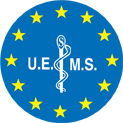
UNION EUROPÉENNE DES MÉDECINS SPÉCIALISTES EUROPEAN UNION OF MEDICAL SPECIALISTS
- Areas of Expertise
The European Accreditation Council for CME (EACCME®)
Under the impulse of a growing shift from voluntary to mandatory CME-CPD in Europe, the European Union of Medical Specialists (UEMS) set up the European Accreditation Council for Continuing Medical Education (EACCME ® ) in October 1999.
The UEMS-EACCME ® began its activities in January 2000 with the mutual recognition of accreditation of EU-wide and international CME-CPD activities for live educational events through the awarding of European CME credits (ECMECs) to individual medical specialists, allowing the recognition and exchange of CME credits between all European countries.
In April 2009 the UEMS-EACCME ® launched the accreditation of e-learning materials. By e-learning is meant the delivery of CME-CPD by methods including: recorded audio, recorded visual, recorded on Compact Disc (CD), recorded on Digital Versatile Disc (DVD), available on Personal Digital Assistant (PDA), available online via an educational website, or any mixture of the preceding.
The UEMS-EACCME ® sets itself as the central link between the National Accreditation Authorities (NAAs), the UEMS Specialist Sections and Boards (S&Bs), the European Specialty Accreditation Boards (ESABs) and the Providers of CME activities.
The UEMS-EACCME ® has mutual recognition agreements with the American Medical Association (AMA) for live events and e-learning materials and with the Royal College of Physicians and Surgeons of Canada for live events only.
IMPORTANT NOTICE: For providers which are not established in Europe, please ensure that you have read the information about our agreements with the American Medical Association (AMA) and the Royal College of Physicians and Surgeons of Canada .
As the General Data Protection Regulation (GDPR) stipulates, you can ask to receive all the personal information we have about you. This request is free of charge. You can ask this to the following address: [email protected]. It is important that your demand is signed by you personally.
You may at any time request that we correct or remove the information about you if your information proves to be incorrect or out of date.
This website uses cookies to personalise content, provide social media features and to analyse our traffic. We also share information about your use of our site with our partners who may combine it with other information that you’ve provided to them or that they’ve collected from your use of their services. You consent to our cookies if you continue to use this website.

STUDY MBBS IN EUROPE

MBBS in Europe, Tuition Fees, Admission, Medical Universities
MBBS in Europe is one of the most ideal places for medicine study across the world. People from across the globe comes to Europe to study MBBS. It has become the most preferred place for MBBS study. There are a large number of seats for MBBS in Europe. In the recent times, it has become one of the best choices for all MBBS aspirants. Europe has some of the best universities over the world. MBBS in Europe is the best choice as all the universities there offer world class education. The professors at Europe MBBS universities are extremely professional and expert at the subject. The demand for MBBS Europe has significantly increases over the last one decade. They offer high standard of MBBS education to all the MBBS aspirants.
There are already a huge number of students coming to Europe to study MBBS. Indian Students always prefer Europe to study MBBS as all the universities are approved by NMC. So, you can complete the MBBS course Europe and go back to India to practice there. You can also pursue PG degree from India if you want. The only thing that you need to do, is to clear NMC screening test.
MBBS in Europe Key Features
Universities for mbbs in europe for indian students 2024, ivane javakhishvili tbilisi medical university.
- European University
Taras Shevchenko National University
Bogomolets national medical university, lviv national medical university, gdansk medical university.
Courses Offered by European Medical Universities
- The courses offered by abroad MBBS universities in Europe are broad and informative.
- After completion of the course, you will have a successful career in the medical field.
The courses are the following
Duration of Studying MBBS in Europe
- The duration of MBBS in European Universities is 6 years.
- In these 6 years of MBBS course, 1 year of internship program is also included.
Medium of Teaching While Studying MBBS in Europe
- The medium of MBBS education is European Universities is English
- English is the primary language used to teach MBBS
- Other European languages as per the country is used as secondary language
Intake of MBBS Study in Europe
- The classes for MBBS course study in Europe start by the end of September or October
- The overall procedure of medical education in Europe commences around September onwards
- It is important to be aware that many students will apply from different countries
- The seats are limited and admission is done on first come first serve basis
- It is important for students to apply for admission in July or August
- For simple and convenient mbbs admission in Europe, one must apply earlier
- You can also get in touch with the medical universities in Europe for more information
- They will guide you with your queries through the online service
- You can also get in touch with the consultancy firm
Eligibility Criteria for MBBS in Europe.
- You have to be 17+ years of age on or before 31 st December of the admission year
- You have to complete 10+2 standard exam with science degree
- Your must have Physics, Chemistry, Biology and English as your subjects in 12 th grade
- You also must secure at least 50% in your 12 th grade examination
- You have to qualify NEET exam to apply for MBBS in Europe
- You must present all original documents in the time of admission
Required Documents For MBBS Admission In Europe 2024
- Scanned mark sheet copy of 10 th and 12 th standard
- Birth certificate
- A valid passport
- Migration certificate
- Bank statement of your guardian to confirm that you can afford the tuition fee and living cost
- Medical certificate containing complete reports on HIV and vaccination
- Passport size photographs
- The application form must be filled up
- Offer letter from the European MBBS university
- Air tickets
- Scanned copies of NEET scorecard
- The documents must be 100% original and genuine
- If you face any issue with the authenticity of any document, the admission gets stopped immediately
Planning to Study MBBS ? Fill the Form and Get Detailed MBBS Counselling.
Step by step admission process for mbbs admission in europe.
The admission procedure for MBBS admission in European countries is simple and convenient.
- Fill up the online application form with the right details
- Do no make any errors or else it might lead to elimination of your form
- Once you are done filling up the application form, you will receive offer letter
- The offer letter will be from the university that you have applied MBBS at
- Once you receive the offer letter, you can pay the MBBS course fee
- After payment of the course fee, you can start with the VISA process
- Once you receive the student VISA card, you can catch a flight to Europe
- Make your dream come true at the excellent European Universities
Why MBBS Study in Europe?
- MBBS in study in Europe is the booming hub now
- You can easily find mbbs universities in Europe offering English as the medium of education
- You do not have to pay anything extra for the course in English
- The course material is related to the mbbs syllabus in India
- Hence it makes things quite easier for Indian mbbs aspirants coming to Europe
- The cost of education of mbbs in Europe is quite affordable than in India
- Studying mbbs in Europe is the best option for all Indians
- The living cost in most part of Europe is quite cheap
- The top rated mbbs universities offer affordable accommodation
- Indian food is easily available at these university hotels
- Almost all the mbbs universities are approved by NMC
- You can easily come back to India and get a license after clearing NMC screening test
- You can also stay in Europe and continue your career here
- You can practice anywhere in the world as the universities are recognized by prominent bodies
- MBBS degree in Europe is always of great value than other places
- The university provides world class education to all mbbs aspirants
- They have state of the art infrastructure when it comes to research centres, labs, courses etc.
- The field of medicine in Europe is hugely advanced.
- The medical study in Europe includes field experience as well
- Medicine study Europe for indian and international students are quite productive
- The duration of the course is around 5 to 6 years
- The best universities in Europe for MBBS offer additional support for MD degree
- After completion of mbbs course
- During the course of mbbs in Europe students are exposed to the rich culture of Europe
- They get to learn about new culture and study medicine in Europe together
- Studying mbbs in Europe will not only make you a perfect doctor but also a good person
Fee Structure for MBBS in Europe : 2024-25
Disclaimer: Study Europe Consultants cautiously affirm that the given amount of Tuition Fees is not volatile and subject to change without any prior intimation to the students. Also, the amount is in USD, not in Indian Rupees. To know the exact tuition fees, Hostel Fees, Living Cost and Exchange Value of USD in Indian Rupees, please contact our experts at Study Europe.
Top Medical Universities in Europe 2024-25
Becoming a medical practitioner is one of the most popular career goals that many of the young aspirants have in their minds. Europe is one of the popular destinations among international students for doing medical studies. Medical schools in Europe have plenty of options including different teaching styles, cultures and entry requirements as well which makes it easier for students to choose the university as per their requirement and eligibility.
Being the number 1 university, Tbilisi State University is recognized worldwide by NMC, WHO, FAIMER and AMC and is known for its high-quality medical training. TSU is a public research university regarded as one of the oldest universities in the field of medicine. Tbilisi State University incorporates largest number of medical students from around the globe which is one of the fascinating factor for the medical aspirants.
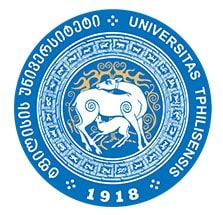
European university was inaugurated in the year 1995 and is known for its high-quality medical training incorporating largest number of medical students from around the globe. European university in Georgia have been focusing on its high-quality education along with affordable fee structure which attracts the medical aspirants from across the globe.
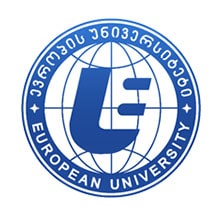
Taras Shevchenko National University of Kyiv is one of the most prestigious university in Ukraine and specialises in diverse fields of knowledge and in research areas. Gaining fame for higher education Taras Shevchenko National University of Kyiv is the most preferred option for medical aspirants who wish to pursue MBBS from abroad as its world rank is within 550 and is third oldest university in Ukraine.
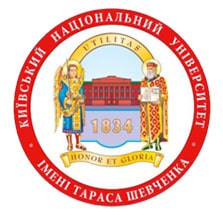
Being regarded as one of the premier Medical University in Ukraine, Bogomolets National Medical University achieving excellence in academics and research. Bogomolets National Medical University being established in the year 1841 in Kyiv, Ukraine is worldwide acknowledged medical university. Bogomolets National Medical University is the most preferred option for medical aspirants who wish to pursue MBBS from abroad as its world rank is 4516 and country rank is within 21.

Lviv National Medical University is accredited for its historical and international environment in entire Ukraine. Lviv National Medical University was inaugurated in the year 1784 and is the only university providing education in more than 90 PG courses. Lviv National Medical University is considered to be one of the biggest and oldest medical universities in Ukraine.
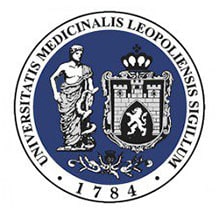
Gdansk Medical University is known as one of the founders of health care amenities and clinical hospitals. Medical University of Gdansk is gaining fame as it is offering an excellent health care facility for the people of Pomerania. Gdansk Medical University came into existence in the year 1945 and is a non-profit public university providing higher education in medical sector.
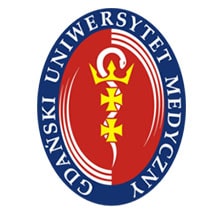
European MBBS Education System
- The European Union has 28 active members
- The European countries vary in their structure of education
- Each country has got their own mbbs education system
- Every country in Europe is a part of European Higher Education Area (EHEA)
- The EHEA ensures and regulates tertiary education system in European nation
- It function towards the improvement of compatibility between the researches, students and academics in Europe
- To study and work abroad without any hassle
- The European qualifications framework is responsible for making a comparison
- Between the qualifications provided in a lot of European mbbs universities
- To maintain and improve the standard of education in Europe
- Medical programmes of Europe has lectures, assessment, through essays, coursework, practical
Scholarships for Studying MBBS in Europe
- There are hundred thousands of financial support and scholarship programs in Europe for MBBS aspirants
- There are some schemes that cover half of the tuition fees
- There are some aids that covers the whole tuition fees and living cost of the student
Education Loan Assistance for Indian Students
- Education loan is an important factor to consider for all mbbs aspirants
- The consultancy firm will help you through the process of educational loan
PG options after MBBS in Europe
- Students who complete their mbbs education from Europe are offered PG options
- They can practice in USA after the USMLE qualification
- They can join a PG program in Germany
- After PLAB passing you can practice in UK
- After the qualification of NMC you can practice medical in India
- After AMC you can practice in Australia
- After passing language and practice licensing exam you can continue practicing in other European countries
- Overall, there are a lot of PG options available to the students after graduation in abroad
Career Scopes after MBBS Europe
There are a lot of career scope options after MBBS in Europe.
- Hospital management is one of the best options
- You can set up your own clinic
- You can start working as a doctor in any multinational hospital
- You can specialise in some specific field such as surgeon, gynaecologist and so on.
MBBS Syllabus in Europe
- General Histology
- Biochemistry
- Microbiology
- Forensic Medicine and Toxicology
- Anaesthesiology
- Pharmacology
- Dermatology and Venereology
- Community Medicine
- Ophthalmology
- Otorhinolaryngology
- Gynaecology
- Paediatrics
Studying MBBS in Europe for Indian Students
- In India, there is massive competition to get a seat in any mbbs university
- This is because of the large number of Indian mbbs aspirants
- The competition becomes complex and most of the mbbs aspirants do not get a seat
- The course fee of private institution are also very expensive
- That is why students from India tends to come to India to study medicine
- MBBS education in Europe is of world class level
- The state of the art infrastructure and world class faculty is perfect for indian mbbs aspirants
- The tuition fees and living cost in Europe is quite affordable for Indian students
- They offer globally accepted mbbs degrees
- The mbbs universities in Europe are recognized by NMC, WHO and other prominent bodies across the globe
- Most of the places in Europe are safe for students
- There is no admission test such as TOEFL or IELTS required for admission
- The admission process is simple and straightforward
- No donations are required for admission
- You can get Indian food here if you crave for some homely food
- The climate is suitable for Indians
Recognition of European MBBS Universities
The European medical colleges are recognized by some of the most prominent bodies across the world.
- NMC (National Medical Commission)
- WHO (World Health Organization)
- Ministry of Education, Georgia
- WFME (World Federation for Medical Education)
- ECFMG (Educational Commission for Foreign Medical Graduates)
- FAIMER (The Foundation for Advancement of International Medical Education and
Things you Should Know Before Applying for MBBS in Europe
- Know about the course fee of the university
- Check if the university is accredited by NMC, WHO and other renowned institutions
- Check the number of Indian students pursuing mbbs in that university
- Safety of the place
- Check if they serve Indian food
- You should know their NMC/FMGE passing percentage
- Know the number of Indian students
- Scope after completion of mbbs course in Europe
- Know whether university is under govt or private
Benefits of MBBS Course in Europe for Indian Students
- The education system of European medical university is world class
- Affordable course fee
- Universities recognized by renowned institutions across the globe
- NMC approved medical degrees from European mbbs universities
- English is the medium of mbbs education
- Extra curriculum activities for students
- Debates, social events, seminars for Indian students
- Theoretical and practical approach of education and perfect balance between both
- Climatic condition perfect for Indian students
- Hostel facilities in the university
- Indian food available in the hostels
- Indians can continue their study in India or practice in India after NMC screening test
Popular Countries for MBBS Europe
Most of the science students aim at becoming engineer or doctor. Talking about the medical field here, there are many countries which offer the best MBBS programs in the world. For the students here, there are many Low-cost European medical schools which help the Indian students as they have quite affordable MBBS course fee in Europe.There are some popular countries that has become the booming hub for MBBS aspirants.
MBBS in Romania

Some of the best MBBS universities in Romania are-
- University of Medicine and Pharmacy in Timisoara
- University of Oradea
- University of Medicine and Pharmacy “Carol Davila”
MBBS in Poland

Recommended universities for mbbs in Poland
- Medical university of Lodz
- Medical university of Lublin
- Medical University of Gdansk
MBBS in Germany

Recommended German MBBS Universities
- Humboldt University
- Phillips University
- University Heidelburg
MBBS in Belarus

Belarus Universities for MBBS
- Belarussian state medical university
- Gomel State Medical University
- Grodno State Medical University
MBBS in Georgia

Best Georgian universities for MBBS
- Ivane Javakhishvili Tbilisi State University
- Batumi Shota Rustaveli State University
- David Tvildiani Medical University
Disadvantages of MBBS in Europe
- Language barrier is one of the biggest issues in Europe
- Communication is an important factor of being expert at medical field
- You have learn a new language at Europe
- Homesick is a common problem faced by students coming from other countries to study mbbs
- Unavailability of dead bodies as unlike India, European countries are not given dead bodies for practical work
- Harsh weather conditions
- Many European countries do not have a few climatic diseases that one can find in India
- Hence these type of diseases are out of the syllabus in such countries
- There is always the risk of being deprived or cheated by fraudulent overseas consultancy firms
- The night life at Europe can be distracting for students as there are no guardians to stop them
MBBS Fees Structure and Course Duration in Europe
Vacations during mbbs in europe.
- Summer holidays and winter holidays
- Christmas eve and new year 1 st Jan
- Local holidays
- Students tend to come back to India or their home country during summer/ winter holidays
- They can also roam around and discover new culture of Europe
FMGE Passing Percentage after completion of MBBS Course in Europe
- The pass percentage of FMGE has decreased drastically down the years
- 3% candidates passed in 2012-2013 whereas 9.44% passed in 2016-2017
- The data on the of the no. of indian students going to Europe to study medical is not available
- The data is not maintained by the government
- Along with the FMGE Results 2019 declaration;
- Total Number of Appeared Candidates: 13,364
- Total Number of Passed Candidates: 2,767
- Total Number of Failed Candidates: 9,006
- Number of Candidates for whom Result has been Withheld: 1,161
- Absent Candidates: 430
- Overall Pass Percentage: 20.70%
About Europe
- Europe covers an area of 10,180,000km sq
- It stretches from Asia to the Atlantic and from Africa to Arctic
- Europe has temperature climate
- It fluctuates from 6 degree C in Amsterdam to 22 degree C in Malta
- There are 24 official languages in the European Union
- Europe offers mbbs program in English mostly, then in Spanish, French,German
- There are many other languages
- Fruits are widely consumed in Europe
- Typical food is cold cut, smoked salmon, savour full spreads, bread
- Indian food is available
- Europe as a cultural concept is derived substantially from the heritage shared by Roman Empire
- The economy of Europe is the largest on Earth
- Currency used here is Euro (EUR)
- Living in Europe is affordable and living cost depends from place to place
- 112 is the SOS emergency number in Europe
Safety of Indian Students in Europe
- Europe is quite safe for students coming from India or abroad
- Countries such as Kazakhstan or Georgia is the safest of all
- Although you should take a few precautions for unpredictable happenings
Accommodation for MBBS Europe
- European Universities offer hostel facilities to the students
- The hostel fees is quite affordable
- Students can stay in the campus
- There are private hostels available as well
- Hostels are equipped with all the important amenities
Is NEET Required for Studying MBBS Europe
- According to the Ministry of Health and Family Welfare and NMC, NEET is mandatory now for all Europe MBBS aspirants
- Indian students can go to foreign countries though to study MBBS even if they fail in NEET exam
- They will not be allowed to practice in India if they face failure in NEET
Is MBBS in Europe possible without NEET?
- The new rules by NMC and ministry of health and family welfare says that NEET is compulsory
- Every candidate has to sit for NEET exam to pursue MBBS in abroad
Impact of NEET exam on MBBS in Europe
- The recent rules by NMC and ministry of health and family welfare states that NEET is needed
- Every MBBS Aspirant must sit for NEET to complete MBBS
MBBS seat in India after passing NEET exam
- Qualification of NEET is nothing but a formality to apply for a set in MBBS University Europe
- Students get the seats on rank basis
- If you passed in NEET exam and fall into good ranking category you can get MBBS admission in India
- You need to pass NMC screening test to practice in India
Benefits of MBBS in Abroad after NEXT exam
- Passing percentage shall be high as the students are firstly qualified from NEET
- They will get high quality MBBS education in abroad countries
- Competition shall be similar for Indian and overseas students
Frequently Asked Questions
When does the application procedure start for mbbs.
The application intake usually begins in October. Interested applicants must send it by then.
What would be the eligibility criteria?
One must have scored 50 percent in Physics, Chemistry, Biology and English. Also, clearing NEET for MBBS admission in Europe is necessary.
What will be the fee structure for MBBS study in Europe?
For Studying MBBS in Europe for Indian Student, the universities charge around 3000 to 8000 USD per year. Hostel charges include around 210 to 270 USD per month.
What would be the duration of the MBBS course?
The course will be around 6 years including the last one year for internship.
Are European universities recognized by NMC?
Most of the European universities are recognized by WHO (World Health Organisation) and the NMC (National Medical Commission).
What would be the Medium of Teaching for MBBS in European Universities?
English is the primary language used to teach MBBS in European universities. Other European languages, depending on the country, are being used as a secondary language.
Is the awarded MBBS degree valid in India?
Yes, the awarded MBBS degree is valid anywhere. You will easily get career opportunities in India after clearing the NMC screening test.
What about the faculty at the European Universities?
The faculty are highly experienced. The teaching faculties have the required experience. They are expert in their fields. They are friendly with students and help them in their studies. Teachers at the European Universities are hard working.
Can student do part time work while MBBS studies?
Some European universities do allow part time work while MBBS studies subject to certain terms and conditions.
Why Choose Study Europe Consultants for MBBS in Europe?

- We are one of the best record holder education consultant in India.
- We have an expert team of consultants offering well-researched assistance
- Comprehensive counselling to all the students
- We have multiple centres across the subcontinent
- We believe in providing excellent results and best experience for all mbbs aspirants
- We aim to make every MBBS aspirants dream come true
- 24×7 support service
- One stop solution for all your international course consultation needs
- Competitive consultation fees
- EMI available on processing fee
- Experienced and skilled support staffs and professors
- Reliable and repute consultancy in the field of abroad studies
- Tied up with top class universities across the globe
Popular Tags
Top Universities in Abroad
Contact now, +91-9289064809, [email protected].
REVIEWS AND STUDENTS TESTIMONIALS
MBBS in Abroad

Swati Goraha
Why I choose Study Europe – the best consultant in Delhi is the transparency, professionalism, and the continued support in seeking admission to a NMC-approved college offering MBBS in Ukraine.

Surendra Sharma
What I liked the most About Study Europe was the professional counseling and the assistance at every stage. The admission process of MBBS in Ukraine based university was made hassle-free for me.
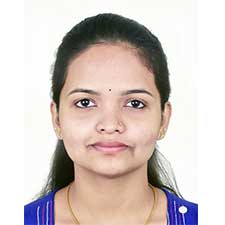
Pooja Sharma
The fee structure is quite affordable at Russian MBBS universities which are a great advantage for Indians, as fees in India are quite high.

Sangeeta Gupta
Being a single child of my parents, it was really difficult for me to convince my parents to send me abroad. But after having talks with Study Europe my parents allowed me to study MBBS in Kazakhstan.

Deepak Yadav
Since schooling, I wanted to do a course in medicine but I was not familiar with the admission process. But Study Europe Consultants helped me in choosing my dream college based in Georgia.

Prakash Tiwari
I had a dream to become a doctor. My dream got fulfilled by Study Europe. They are very helpful and I had no difficulty in getting admission to an international university in Belarus.
View Photo Gallery
MBBS in Europe
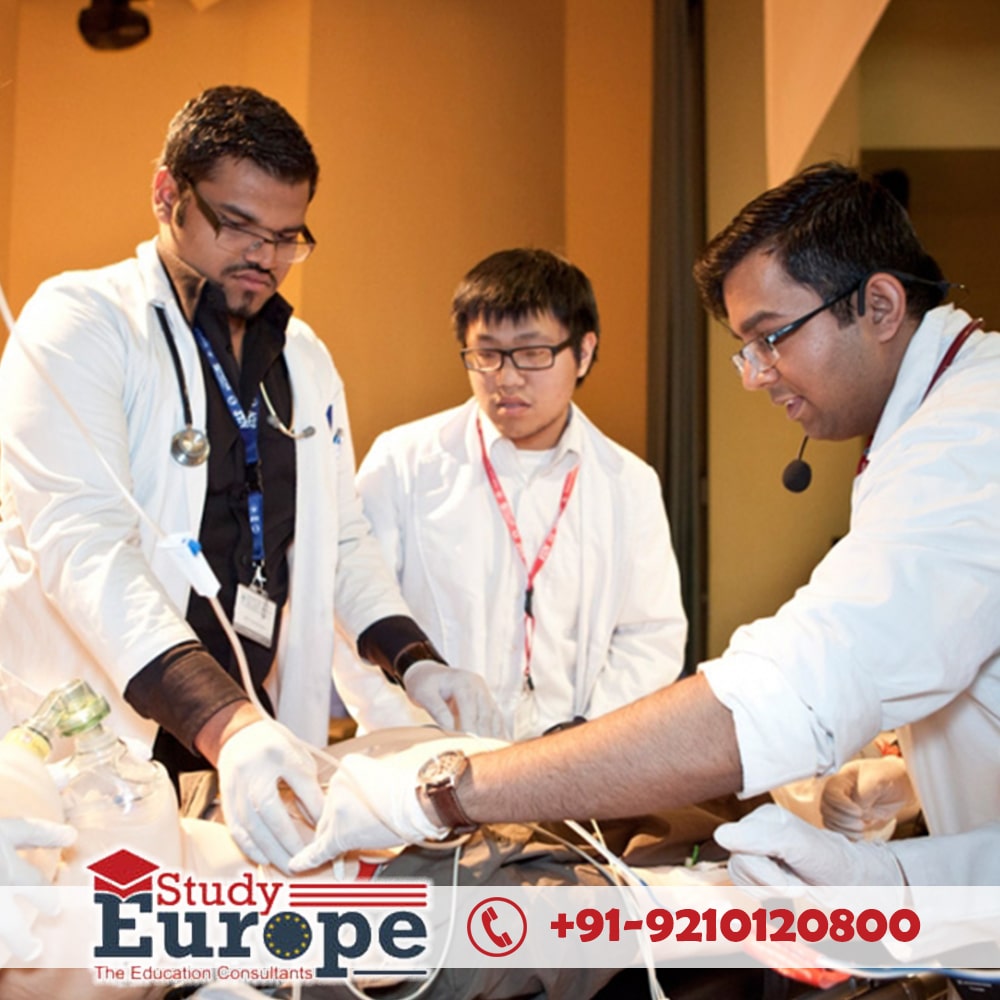
Development of continuing medical education in Europe: a review
Affiliation.
- 1 Department of Postgraduate Medical Education, Institute for Postgraduate Education in Medicine and Pharmacy, Prague, Czechoslovakia.
- PMID: 2215293
- DOI: 10.1111/j.1365-2923.1990.tb02649.x
This short review sets out some general facts and features concerning the development of continuing medical education (CME) in Europe. The review is intended as a basis for proposing plans and action for CME in the future. Europe, as it happens, was the birthplace and cradle of both scientifically based medical education in general and CME in particular. Three stages of development are distinguished: (1) Development of CME from the 19th century up to the beginning of the Second World War; (2) After 1945; (3) CME in the present.
Publication types
- Education, Medical, Continuing / trends*
- Forecasting
- World Health Organization
WATCH LIVE: Memorial service underway at the National Cathedral to honor 7 World Central Kitchen workers killed by Israeli strikes in Gaza
JUST IN: Prince George’s Co. to enforce youth curfew at National Harbor starting Friday
LOCAL UPDATE: First cargo ship passes through newly opened channel in Baltimore since Francis Scott Key Bridge collapsed

The EU will probe whether China is unfairly denying companies access to its medical devices market
The Associated Press
April 24, 2024, 7:52 AM
- Share This:
- share on facebook
- share on threads
- share on linkedin
- share on email
BRUSSELS (AP) — The European Union announced on Wednesday an investigation into whether China is using unfair methods to deprive companies in Europe of access to its market for medical devices ranging from hypodermic needles to high-tech scanners.
The probe launched by the European Commission — the EU’s executive branch as well as its trade and competition watchdog — is the latest attempt to help companies gain the kind of access to China’s vast markets that Chinese firms enjoy in Europe.
“Openness is vital for businesses to thrive, for consumers, and to spur innovation worldwide,” commission trade chief Valdis Dombrovskis said in a statement.
“We are launching this investigation with China so that we can achieve a level playing field in our procurement markets for producers of medical devices, on both sides,” he said. “Regrettably, our repeated discussions with China on this trade irritant have been fruitless.”
Should it fail to resolve the issue, Brussels could restrict the access of Chinese buyers, goods and services to the EU market. It says Chinese exports of medical devices to Europe surged more than 100% between 2015 and 2023.
The commission said it has gathered evidence indicating that China’s market has gradually closed to European firms and products made in the EU. It asserts that measures introduced by China “unfairly differentiate” between local and foreign companies. It did not quantify the effects on European businesses.
France, Germany, Italy and the Netherlands are among the countries worst hit, the commission said, but it added that the medical device market is so big that many large companies and thousands of small and medium-sized enterprises around Europe might be suffering unfair treatment.
The first step in the investigation — which could take from nine to 14 months to complete — will be for the commission to send a list of questions to Chinese authorities.
The commission is hopeful that no action will be needed. It says the main aim is to win fair treatment for all sides. “Our expectation is that China’s market for public procurement will be as open to us as ours is to them. Simple. Nothing more, nothing less,” spokesman Olof Gill told reporters.
But China’s foreign ministry said the EU move smacked of protectionism.
“The EU has always touted itself as the most open market worldwide, but what we see now is that it is gradually moving towards protectionism,” ministry spokesman Wang Wenbin said.
“We urge the EU to adhere to its commitment to the open market and the principle of fair competition, abide by WTO (World Trade Organization) rules, and stop unwarrantedly suppressing and restricting Chinese companies on various pretexts,” he said.
Kelvin Chan in London contributed to this report.
Copyright © 2024 The Associated Press. All rights reserved. This material may not be published, broadcast, written or redistributed.
Related News

Congo questions Apple over knowledge of conflict minerals in its supply chain

Chinese ship remains prime suspect in damage to Baltic Sea gas pipeline that reopened this week

French president outlined his vision for Europe as an assertive global power amid war in Ukraine
Recommended.

First cargo ship passes through newly opened channel in Baltimore since bridge collapse

Prince George's Co. to enforce youth curfew at National Harbor starting Friday

New York appeals court overturns Harvey Weinstein’s 2020 rape conviction from landmark #MeToo trial
Related categories:.
- - Google Chrome
Intended for healthcare professionals
- Access provided by Google Indexer
- My email alerts
- BMA member login
- Username * Password * Forgot your log in details? Need to activate BMA Member Log In Log in via OpenAthens Log in via your institution

Search form
- Advanced search
- Search responses
- Search blogs
- News & Views
- Medical device firms...
Medical device firms paid UK health organisations €37m in three years, study finds
- Related content
- Peer review
- Elisabeth Mahase
Medical device companies made over €37m (£32m; $39m) of education related payments to UK health organisations, including the NHS, between 2017 and 2019, researchers have reported. 1
Researchers from RCSI University of Medicine and Health Sciences and the University of Bath used the MedTech Europe transparency platform to look at reported payments and found that in three years 116 companies made payments totalling over €425m across 53 countries.
The paper, published in Health Policy and Technology , showed that the amount paid out rose from just under €94m in 2017 to just over €175m in 2019. Just 10 countries accounted for 94% of all payments, while 10 companies accounted for 80% of all payments made.
The authors have highlighted “many shortcomings” with the disclosure system, including that payments for consultancy and expenses are not included, and called for a new Europe wide, publicly mandated disclosure system for both the medical device and pharmaceutical industries.
“There is a large amount of education related payments from medical device companies to European healthcare organisations, creating substantial potential for conflicts of interest,” the authors wrote.
Among the countries looked at, the UK ranked as the third highest recipient of such payments, behind Switzerland (almost €17m) and Spain (nearly €86m).
Guy’s and St Thomas’ NHS Foundation Trust and the London School of Hygiene and Tropical Medicine received the largest payments.
Education related payments are used to support the education of doctors and healthcare professionals through fellowships, grants, scholarships, and “educational events.”
Looking at the companies that paid out the most, the researchers highlighted Johnson and Johnson Medical (over €184m), Abbott Laboratories (over €44m), and Boston Scientific (over €33m).
Lead author James Larkin, researcher at the RCSI University of Medicine and Health Sciences, Dublin, said, “This is not a trivial matter. The payments reported represent a conflict of interest. We know that free lunch can influence clinical practice, so this begs the question: could these payments undermine patient care?”
Co-author Piotr Ozieranski, researcher at the Centre for the Analysis of Social Policy, University of Bath, added, “If you are being fitted with a pacemaker, you trust the device has been chosen in the best interests of patient care, not because of a financial incentive. The stakes are high if this is undermined, as evidenced by the mesh implants scandal.”
Making reporting mandatory
While it is not a legal requirement for medical device companies to disclose payments, the authors argue this should change. “Considering the vast sums of money involved, this is a major accountability and transparency matter,” Ozieranski said. “An EU mandated system of disclosure for the medical device and pharmaceutical industries could tackle these shortcomings and enhance transparency in the healthcare sector’s interactions with industry.”
Larkin believes that if reporting of all payments became mandatory, it would likely show that the figures from their study are only “the tip of the iceberg.”
“Compare the €37m reported by medical companies with the €2.96bn reported by the pharmaceutical industry, which has greater transparency,” he said.
- Mulinari S ,
- Ozieranski P ,
Politics latest: Labour and Lib Dems to back no-confidence motion in Yousaf; migrants picked for first Rwanda flights, Number 10 says
Scotland's first minister Humza Yousaf is facing the prospect of a vote of no-confidence after ending the SNP's deal with the Greens; Downing Street says the first flight has been booked after the Rwanda bill became law.
Thursday 25 April 2024 16:02, UK
Please use Chrome browser for a more accessible video player
- Scottish Labour and Scottish Lib Dems to back motion of no confidence in first minister, Sky News understands
- Yousaf says deal with Greens has 'served its purpose' as he confirms agreement scrapped
- Rwanda bill becomes law | First flight has been booked, Number 10 says
- Rob Powell: Royal assent 'the easy bit' as legal challenges and key deterrence test loom
- Rail shake-up will deliver 'significant' savings for taxpayer, Labour says
- Sam Coates: It will be popular with the public, but will the railways be better off under Labour's plans?
- Sky News/YouGov polling finds spiralling level of distrust in politics since last election
- The Politics Hub with Sophy Ridge will be live in Grimsby with a special programme from 7pm
- Live reporting by Samuel Osborne (now) and Charlotte Chelsom-Pill (earlier)
The government has issued new sanctions targeting Iranian individuals and businesses "closely involved" in Iran's network of drone production.
Two people linked to the country's network of drone production will be subjected to a UK travel ban and asset freeze, while four companies will face a UK asset freeze.
It comes after Iran launched an unprecedented wave of missile and drone attacks on Israel on 13 April.
Foreign Secretary Lord Cameron said: "The Iranian regime's dangerous attack on Israel risked thousands of civilian casualties and wider escalation in the region.
"Today the UK and our partners have sent a clear message – we will hold those responsible for Iran’s destabilising behaviour to account.
"Alongside our partners, we will continue to tighten the net on Iran’s ability to develop and export these deadly weapons."
The government is "committed" to banning conversion therapy despite delays, an equalities minister has said.
Stuart Andrew told the Commons it is a "very challenging issue to get right" but added the government is clear the practice is "abhorrent".
A ban on conversion practices, which aim to suppress or change a person's sexual orientation, was first promised by former prime minister Theresa May in 2018.
Labour's shadow minister Ashley Dalton had accused the government of not being able to make up its mind and of kicking the issue into the long grass.
Mr Andrew replied: "No one in this country should be harmed or harassed for who they are and attempts at so-called conversion practices are abhorrent.
"And we're clear on our stance, that they are harmful and they simply do not work.
"And that's why we are committed to publishing the draft Bill, I know it's taken time but it's been a very challenging issue to get right and I am committed to us doing it."
Earlier this year a Conversion Practices (Prohibition) Bill, tabled by Lloyd Russell-Moyle, Labour MP for Brighton, Kemptown, in a bid to ban offering or advertising the controversial practices, was blocked by MPs.
During the bill's debate on 1 March, equalities minister Maria Caulfield said the government intended to bring forward draft legislation following the Cass Review, which was published on 10 April.
By Connor Gillies , Scotland correspondent
This is absolutely explosive stuff here in Scotland today.
This is a first minister in Humza Yousaf who just two days ago was telling Sky News that he was wanting the pact with the Greens to continue.
It's all been rosy in the garden for a long time between the two parties, but things started to deteriorate in the last couple of weeks, first over the Cass report and then the big moment when the Scottish government ditched one of their key climate targets.
At that point, the writing was on the wall.
Green Party members were furious and called a vote on their future role themselves, which was due to take place in the next couple of weeks.
It could be said Mr Yousaf saw what was potentially coming and decided to take charge of the issue, rather than facing humiliation of the Greens taking themselves out of that arrangement.
But now the SNP will run a minority government here at Holyrood, and we've had confirmation the first minister will face a no confidence vote next week, the ramifications of which could be huge.
Labour have confirmed to Sky News they will back that motion. The Liberal Democrats will do the same.
And the Greens, who are absolutely furious, are due to meet before the end of the working day to discuss how they will vote.
So has this backfired on Mr Yousaf today, who was trying to get on the front foot to try and save his reputation in what has been a really difficult couple of months?
Could it all end in jeopardy? We'll soon see.
By Nick Stylianou, communities producer
More than 115,000 asylum seekers will be trapped in "permanent limbo" by the end of the year as a result of the government's flagship migration plans, according to a detailed study by the Refugee Council.
The effect of the Rwanda plan will cause the already-struggling UK asylum system to go into "meltdown", said chief executive Enver Solomon.
He claimed the plans would cause "immense cost, chaos and human misery" and "any government that wants a fair and efficient asylum system should repeal the legislation, stop wasting resources on futile endeavours and focus on the vital task of processing asylum claims promptly and fairly".
Under the current laws, anyone entering the country illegally - such as by small boat across the Channel - is banned from applying for asylum as their cases are deemed "inadmissible" and the home secretary must arrange for their removal.
However, the report by the UK's leading asylum seeker charity concludes that "in reality, only a small proportion" are likely to ever be sent back to their own country or Rwanda.
The Refugee Council estimates, based on the average number of people arriving illegally over the past two years, only about 2,000 people will be flown to Rwanda by the start of 2025.
The rest will be left relying indefinitely on Home Office support or disappear underground.
Its analysis of Home Office figures sets out that, at the end of 2024, at least 105,309 "men, women and children" will be eligible to be removed and only 9,478 of those will be qualified to be returned to their own country.
Further calculations by the charity warned the impact of the three immigration laws passed by the government - the Nationality and Borders Act 2022, the Illegal Migration Act 2023 and the Safety of Rwanda Bill - are likely to cost taxpayers up to £6.2bn a year in accommodation costs alone as a result of people unable to be removed.
The Home Office confirmed 6,667 people crossed the Channel so far this year, with 402 making the journey successfully yesterday - the day five people died while attempting the same.
Labour's shadow home secretary Yvette Cooper said the government's asylum policy "is a farce" and Labour's plan relied on recruiting 2,000 extra Home Office staff to work on processing and returning people.
She accused ministers of choosing "gimmick over grip".
A Home Office spokesperson said: "We are removing thousands of illegal migrants to their country of origin.
"Many of this cohort will be in scope for removal to Rwanda, which is an uncapped scheme, and can expect to be served removal notices in due course."
Former Scottish Conservative leader Ruth Davidson has said the collapse of the power-sharing deal between the SNP and the Scottish Greens today is a "pretty bitter divorce".
Speaking on Sky News' latest Electoral Dysfunction podcast, the Tory peer says: "This isn't a conscious uncoupling like Gwyneth Paltrow and Chris Martin. I mean, this is a proper a bitter doozy."
She says it will be "really interesting" to see whether the Greens are "so angry" that they vote with other opposition parties in Holyrood, having previously been "pretty willing allies of the SNP".
"It will be really interesting as we go forward to find out whether they want to exact revenge or whether they're going to be more independent-minded than they have previously been in previous parliaments," she says.
Earlier, Scottish Greens co-leader Patrick Harvie said the SNP can no longer rely on its votes in parliament after First Minister Humza Yousaf terminated the deal ( see post at 1.31pm ).
Mr Yousaf will now lead a minority government ( see post at 10.16am ).
Ruth says the move was a "sign of weakness" from Mr Yousaf.
"He had to pull the trigger before he was dumped," she says.
You can hear Ruth's comments in full on Sky News' latest Electoral Dysfunction podcast - out at 6am tomorrow.
👉 Tap here to follow Electoral Dysfunction wherever you get your podcasts 👈
Email Beth, Jess, and Ruth at [email protected] , post on X to @BethRigby, or send a WhatsApp voice note on 07934 200 444.
This was a trip with two aims: to refocus the world's attention on Ukraine and announce a big boost in defence spending - with an eye, of course, on national security, but also on the general election.
When it comes to Ukraine, this was a co-ordinated effort across the Atlantic.
As Rishi Sunak arrived in Berlin, overnight in Washington the US was finally approving a $600m military aid package for Kyiv.
This was all designed to send a message to Russia - allies are in lockstep and will stand behind Ukraine for as long as it takes.
The prime minister used the Poland leg of the trip to commit the UK to spending 2.5% of GDP on defence by 2030, while in Berlin, Mr Sunak announced a formal bilateral security partnership with Germany to deepen co-operation on defence and military manufacturing.
It was all part of his agenda to position himself as a wartime leader, speaking of the UK's defence industry going onto a war footing as Europe stood at a turning point.
"The world we are living in is increasingly dangerous and the axis of authoritarian states are working together to undermine our security," he told his audience in Berlin.
"We need to do more. Germany has done more and we have met the NATO standard [on spending], and you see global defence spending is rising."
Mr Sunak added: "I do believe we will look back at this moment in time and recognise this inflection point, where the old paradigm is no longer the case and we need to adjust for a new paradigm."
Read Beth's full analysis here:
People voting in local elections in England on 2 May will need to provide photo ID.
It is the second year the requirement has been in place - but in 2023, 14,000 people couldn't cast their ballot because they didn't take ID to the polling booth.
There are 22 different types of ID you can use - and if you don't have any of them, you can register for a Voter Authority Certificate.
Here's everything you need to know to avoid being caught out:
The Scottish Labour Party and Scottish Lib Dems are to back a motion of no confidence in First Minister Humza Yousaf, Sky News understands.
It comes after the Scottish Conservatives confirmed they have lodged the motion after the power-sharing agreement between the SNP and Scottish Greens collapsed.
Mr Yousaf is now leading a minority government.
Sky's Scotland correspondent Connor Gillies has said the Greens "are absolutely furious," and are due to meet by the end of the day to decide how they are going to vote.
Connor says if Mr Yousaf loses the vote, expected next week, the SNP would have to install a new leader within 28 days.
The SNP have 63 seats in the Scottish parliament.
The Scottish Conservatives have 31, Scottish Labour have 22 and the Scottish Liberal Democrats have four - a combined number of 57.
The Greens have seven MSPs.
There is also one Alba Party MSP and a presiding officer of no party affiliation.
By Nick Martin , people and politics correspondent
June gives me a wry smile when I ask her if she trusts politicians. But it soon fades.
"They promise you the Earth, and you don't see anything. And it's soul destroying," she says.
I meet her and husband Joe as they tuck into fish and chips in the town's oldest chippy, the Peabung, which has served this town since 1883.
June tells me she really wants to trust politicians but they "just mess it up every time". I ask Joe if he thinks politicians care about him? "Well hopefully they do. I'm not sure really."
He stops to think for a moment. "I don't really trust politicians," he says.
The findings of a Sky News/YouGov poll are stark and echo how voters like June and Joe feel. The findings suggest voters no longer believe what politicians say.
In some places, there appears to be a deep loss of faith in British politics.
Shannon Donnelly has nearly 200,000 followers on TikTok and has used the platform to develop her Grimsby-based business selling personal safety equipment, such as panic alarms. I ask her if she trusts politicians.
"No - I think things like Brexit has massively changed people's opinion. I won't forget when they said all that money would go to the NHS.
"Now we seem to be in a worse position, but they still expect us to trust them. It's crazy."
Read more here:
The Politics Hub with Sophy Ridge is going to be live in Grimsby tonight with a special programme in our Target Towns series. She'll be talking about trust in politics with a live audience - that's live tonight on Sky News at 7pm.
By Professor Will Jennings, Sky election analyst
The morning after the 2019 general election, Boris Johnson pledged to people in the North East who had voted Conservative for the first time that he and the party would "repay your trust".
That year was the Brexit election, and the Conservatives ultimately won because they and Mr Johnson were trusted to "get Brexit done" - Jeremy Corbyn was not.
Five years on, exclusive polling by YouGov for Sky News finds that since then, the number of people saying they "almost never" trust the British government to place the needs of the nation above the interests of their own party has nearly doubled - from 26% to 49%.
This spiralling level of distrust has been greatest for the bedrock of the Conservative's electoral coalition - those who voted to leave the EU in 2016.
The percentage of Leavers saying they "almost never" trust government has leapt by 33 points (from 23% to 56%) since the last election - twice as much as the increase for Remainers.
It is the sort of people who live in places like Grimsby and Cleethorpes, which voted heavily to Leave the EU - by nearly 70% - who have lost most trust in British politics since 2019.
Be the first to get Breaking News
Install the Sky News app for free

Youngkin will visit Europe for his third international trade mission as Virginia governor
Glenn youngkin will visit germany, denmark, finland and switzerland next week for his third international trade mission as virginia governor.

RICHMOND, Va. (AP) — Glenn Youngkin will visit Germany, Denmark, Finland and Switzerland next week for his third international trade mission as Virginia governor.
Youngkin, a Republican, will meet with Finland's president , government officials, strategic business associations, company executives and global industry leaders "to further strengthen Virginia's economic and cultural connections," his press office said Wednesday as it announced his itinerary.
“This economic development trade mission with strong European partners will build on business relations, our shared priorities and highlight the Commonwealth’s capabilities. Virginia’s strong workforce, incredible business environment, robust transportation system and world-class education institutions make the Commonwealth uniquely positioned to attract businesses around the globe," Youngkin said in a statement.
The governor and others in the Virginia delegation will depart Sunday and travel through May 3.
Virginia prides itself on a business-friendly reputation , and governors of both parties have routinely made international trade missions. Youngkin is a former private equity executive who, like other governors, has made business recruitment a vocal priority.
Last year, Youngkin traveled to France to visit the gravesites of Virginia service members killed during World War II's D-Day invasion and attend an international air show, which he touted as a chance to boost the state's aerospace industry .
In April 2023, he led a trade mission to Asia that included a politically sensitive meeting with the president of Taiwan.

Six people, including three children injured after driver crashes into home

Child hit by driver in Roanoke

Bedford County School Board sues parent for $600,000 after disputes over son’s special needs education plan

Two people shot in Southwest Roanoke, suspect still at large

Slight cool down in store for the remainder of the workweek
Latest news.

Trial opens for former Virginia hospital medical director accused of sexual abuse of ex-patients

Virginia school bus hits DMV building, injures driver and two students, officials say

Virginia lawmakers set to take up Youngkin’s proposed amendments, vetoes in reconvened session

Assistant principal ignored warnings that 6-year-old boy had gun before he shot teacher, report says

IMAGES
VIDEO
COMMENTS
Best medical schools in the rest of Europe - QS Subject Rankings 2021. Karolinska Institute, Sweden. Heidelberg University, Germany. University of Amsterdam, the Netherlands. Erasmus University Rotterdam, the Netherlands. University of Copenhagen, Denmark - 40-50% acceptance rate. LMU Munich, Germany.
Medical University of Innsbruck. Karl Landsteiner University of Health Sciences. The Faculty of Medicine at the Johannes Kepler University Linz. Medical University of Graz. Medical University of Vienna. Paracelsus Medical University, Salzburg and Nuremberg.
Differences in Medical Education Across Europe. Despite the Bologna Process's harmonization efforts, the medical education approach still denotes European variability. Countries like the UK, for example, tend to start medical education at the undergraduate level, while others, like Germany, commence at the masters.
Without further adieu, here is our list of the top seven Medical Schools in Europe. 1. University of Oxford. Oxford, UK. Ranked number one in the world in medicine by the Times Higher Education Supplement (2011-16), Oxford University should be high on your list if you're looking to study medicine in Europe.
Karolinska Institutet. Karolinska Institutet ranks in the 7th position as per QS World University Rankings by Medicine 2023. It is located in Stockholm, the capital of the Kingdom of Sweden. The research-led medical university is renowned for its cutting-edge life sciences and medical education system.
Medical University of Bialystok. Bialystok University is one of the largest medical schools in Poland, with more than 13,000 graduates from its esteemed medical program alone. Those who wish to study medicine in Europe will find an impressive 26 departments, 40 clinics, 2 study centres, and 2 independent laboratories in the English division alone.
4. Charité - Universitätsmedizin Berlin, Germany. The Charité - Universitätsmedizin, Berlin, is a renowned medical school in Europe. The college holds over 50% of all Nobel Prizes in physiology or medicine. It is also home to one of the best hospitals in Europe, which provides students with a practical approach to medical training.
The cost of living is often lower in Europe - particularly in Cyprus, where UNIC Medical School is based. Their tuition fees are €18,000 (~£15,000) for each of the first three years and €22,000 (~£19,000) for each of the last three years. For international students outside of the UK, choosing a European Med School like the University of ...
Medical Education in Europe, 1100-1800. Europe's formal medical education system started in the late Middle Ages, with the rise of the universities in what is now Northern Italy. From approximately ad 1100 until the mid-19th century, two tiers of medical practitioners existed: (1) academic doctors and (2) practically trained surgeons (which ...
Tuition Fees - Medical Schools in Europe. Medical School in the US is plainly a fortune. However, medical schools in Europe are considerably cheaper. The cost of a medical degree in the US ranges at $140-240,000 over 4 years. Medical Schools in Europe, however, are almost a third of that, with tuition fees spanning between $60-90,000 over 6 ...
Other applicants meet the entry criteria but are forced to seek medical education in Europe because it's more affordable. Whatever your case, studying medicine in Europe should not be looked down upon or considered an alternative career pathway. The truth is that medical schools overseas offer the same high-quality education and facilities ...
The Association of Medical Schools in Europe (AMSE) Mühlenstrasse 8a D-14167 Berlin Germany. e-mail: [email protected]
Petre Shotadze Tbilisi Medical Academy. Titu Maiorescu University. Medical University of Bialystok. Semmelweis University of Medicine. Medical University of Silesia. 1. University Of Nis. The University of Nis located in Serbia is the first on our list of best medical schools in Europe taught in English.
In this article, the authors present a historic overview of the development of medical education in the United States and Europe (in particular the Netherlands), as it relates to the issues of time (duration of the course) and proficiency (performance requirements and examinations). This overview is …
A Europe of the highest standards in healthcare education and continuous integration of medical curricula across the continent and a prosperous exchange of best practices in interprofessional education. Empower medical students to be part of shaping an education, that responds to advances in medicine, new learning technologies and philosophy of ...
12 Airlie Place. Dundee DD1 4HJ. United Kingdom. E: [email protected]. The Association for Medical Education in Europe (AMEE) is a worldwide organisation with members in 90 countries on five continents. Members include teachers, educators, researchers, administrators, curriculum developers, deans, assessors, students and trainees in medicine ...
Study Medicine, Dentistry or Veterinary in English at the best Medical Universities in Europe. Study Medicine Europe is one of the top medical student recruiters in the world.We are an official representative of many highly-regarded and affordable Medical Universities, Dental Universities and Veterinary Universities in the Caribbean, Greece, Armenia, Georgia, Serbia, Romania, Bulgaria.
Attend AMEE 2024 in Basel,Switzerland. AMEE's flagship event is its annual conference, which brings together educators, researchers, and professionals from around the world who are involved in health professions education. Addressing and showcasing the latest developments and practices in healthcare professions education and beyond, the ...
MEDICAL EDUCATION IN EUROPE 531 the student to obtain a more comprehensive grasp of each subject. "Post-graduate medical education, or Drovision for training of physicians engaged in practice, has been under discussion, but at the present time, "No governmental program for the continuation training of men in practice exists in any country ...
The European Accreditation Council for CME (EACCME®) Under the impulse of a growing shift from voluntary to mandatory CME-CPD in Europe, the European Union of Medical Specialists (UEMS) set up the European Accreditation Council for Continuing Medical Education (EACCME ®) in October 1999.. The UEMS-EACCME ® began its activities in January 2000 with the mutual recognition of accreditation of ...
European university was inaugurated in the year 1995 and is known for its high-quality medical training incorporating largest number of medical students from around the globe. European university in Georgia have been focusing on its high-quality education along with affordable fee structure which attracts the medical aspirants from across the ...
Abstract. This short review sets out some general facts and features concerning the development of continuing medical education (CME) in Europe. The review is intended as a basis for proposing plans and action for CME in the future. Europe, as it happens, was the birthplace and cradle of both scientifically based medical education in general ...
In the UK, 43.5 per cent of the population aged 25-74 had a higher education, which was over the EU's 'Big Four' countries. France (38.2 per cent) had the highest share among them, followed by ...
It says Chinese exports of medical devices to Europe surged more than 100% between 2015 and 2023. ... Md. Board of Education picks Carey Wright as permanent public schools superintendent
Medical device companies made over €37m (£32m; $39m) of education related payments to UK health organisations, including the NHS, between 2017 and 2019, researchers have reported.1 Researchers from RCSI University of Medicine and Health Sciences and the University of Bath used the MedTech Europe transparency platform to look at reported payments and found that in three years 116 companies ...
Oliver Dowden and Angela Rayner stand in for Rishi Sunak and Sir Keir Starmer at PMQs; the PM heralds his defence spending commitment on a trip to Germany.
Bedford County School Board sues parent for $600,000 after disputes over son's special needs education plan Latest News Trial opens for former Virginia hospital medical director accused of ...